VoL. LI
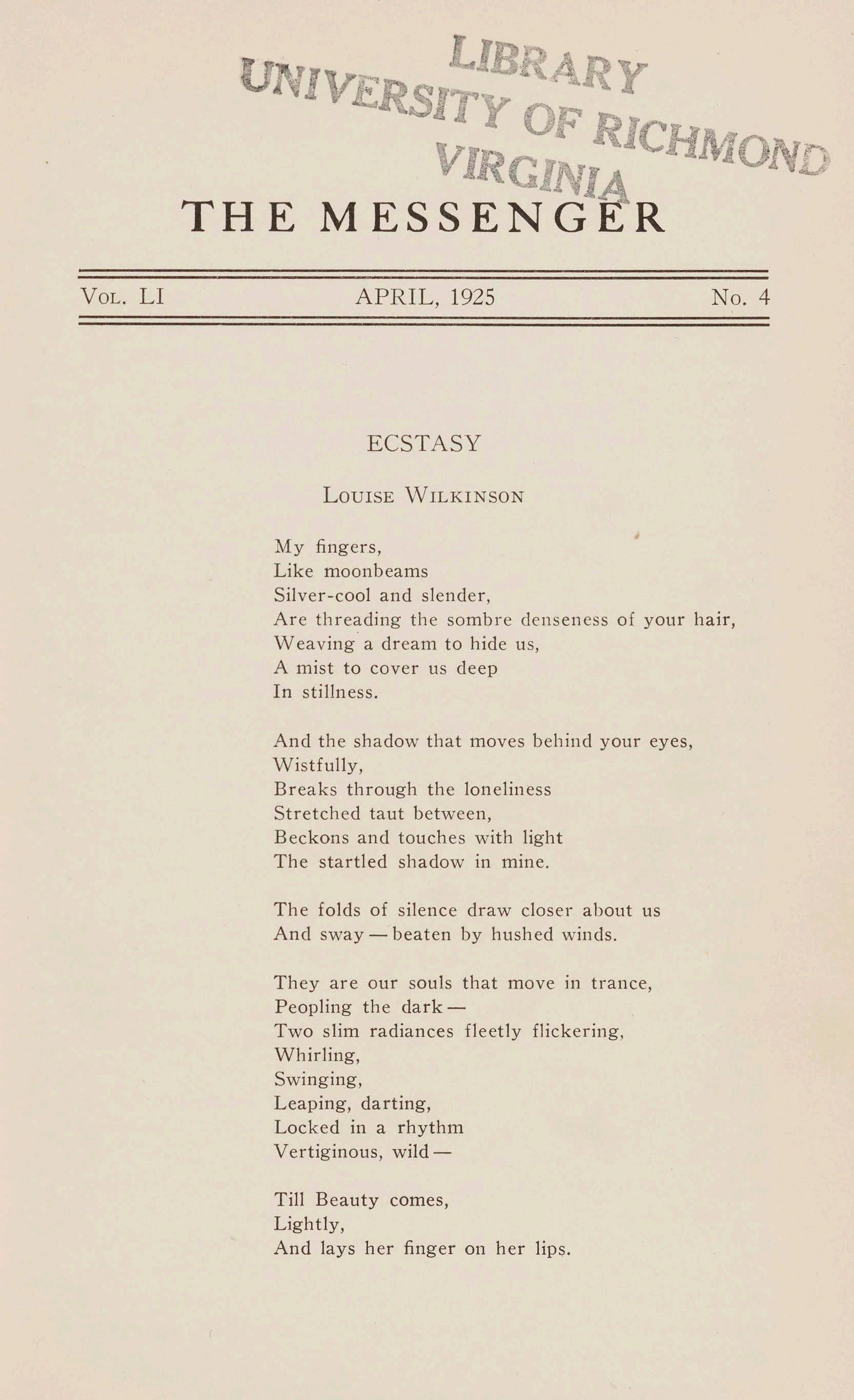

VoL. LI

LOUISE WILKINSON
My fingers, Like moonbeams Silver-cool and slender,
No. 4 Are threading the sombre denseness of your hair, Weaving a dream to hide us, A mist to cover us deep In stillness
And the shadow that moves behind your eyes, Wistfully, Breaks through the loneliness Stretched taut between, Beckons and touches with light The startled shadow in mine.
The folds of silence draw closer about us And sway - beaten by hushed winds.
They are our souls that move in trance, Peopling the darkTwo slim radiances fleet ly flickering, Whirling, Swinging, Leaping, darting, Locked in a rhythm Vertiginous, wild -
Till Beauty comes, Lightly, And lays her finger on her l ips.
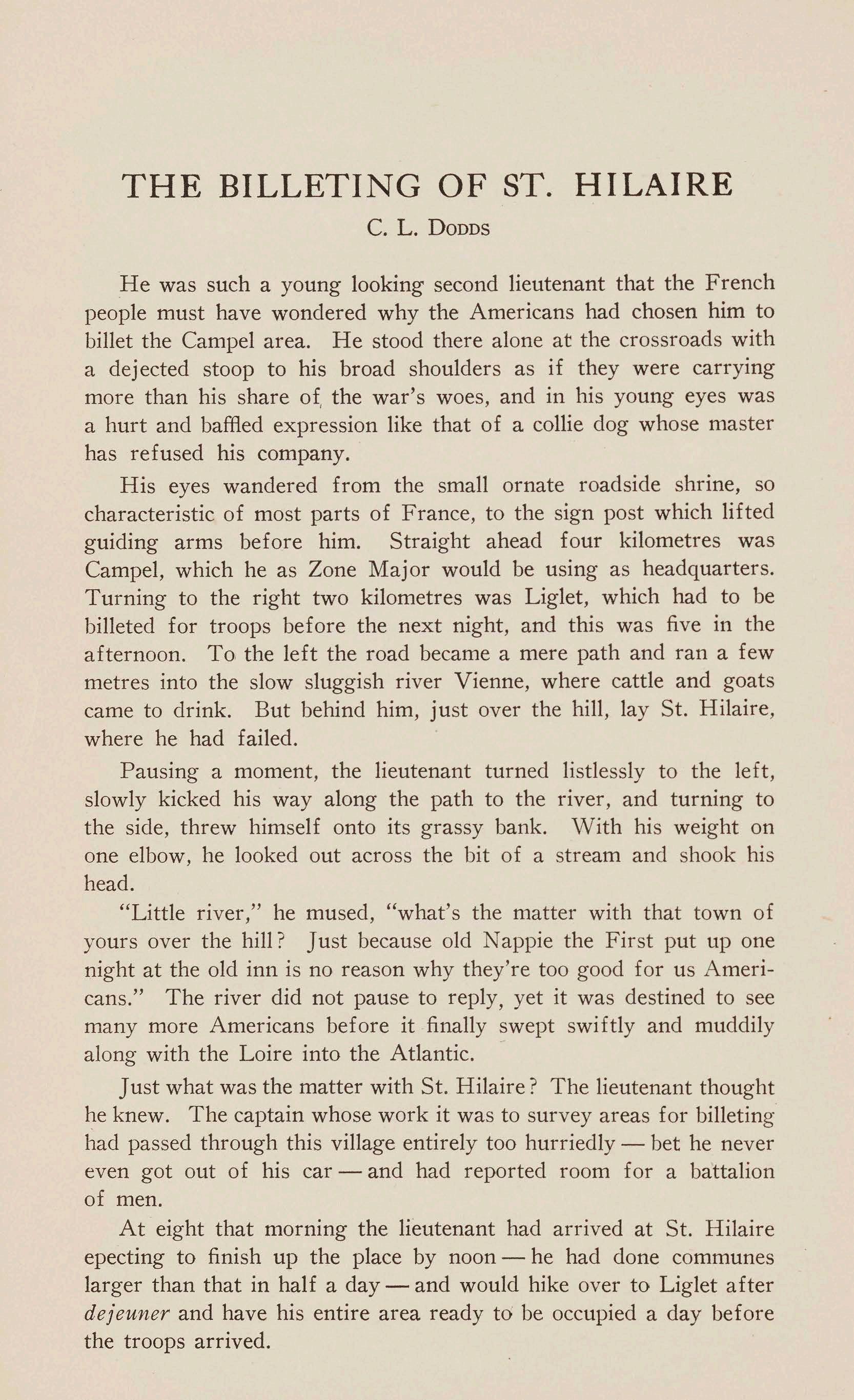
C. L. DODDS
He was such a young looking second lieutenant that the French people must have wondered why the Americans had chosen him to billet the Campel area. He stood there alone at the crossroads with a dejected stoop to his broad shoulders as if they were carrying more than his share of, the war's woes, and in his young eyes was a hurt and baffled expression like that of a collie dog whose master has refused his company.
His eyes wandered from the small ornate roadside shrine, so characteristic of most parts of France, to the sign post which lifted guiding arms before him. Straight ahead four kilometres was Campel, which he as Zone Major would be using as headquarters. Turning to the right two kilometres was Liglet, which had to be billeted for troops before the next night, and this was five in the afternoon. To the left the road became a mere path and ran a few metres into the slow sluggish river Vienne, where cattle and goats came to drink. But behind him, just over the hill, lay St. Hilaire, where he had failed.
Pausing a moment, the lieutenant turned listlessly to the left, slowly kicked his way along the path to the river, and turning to the side, threw himself onto its grassy bank. With his weight on one elbow, he looked out across the bit of a stream and shook his head.
"Little river," he mused, "what's the matter with that town of yours over the hill? Just because old Nappie the First put up one night at the old inn is no reason why they're too good for us Americans." The river did not pause to reply, yet it was destined to see many more Americans before it finally swept swiftly and muddily along with the Loire into the Atlantic.
Just what was the matter with St. Hilaire? The lieutenant thought he knew. The captain whose work it was to survey areas for billeting had passed through this village entirely too hurriedly - bet he never even got out of his car -and had reported room for a battalion of men.
At eight that morning the lieutenant had arrived at St. Hilaire epecting to finish up the place by noon -he had done communes larger than that in half a day-and would hike over to Liglet after dejeuner and have his entire area ready to be occupied a day before the troops arrived.

Reaching the little Mairie, which in all small communes in France is half city hall and half school, he found the Maire busy writing out bread-cards.
"Bon jour, Monsieur le Maire." The lieutenant saluted, then doffed his little overseas cap. "I have come to make arrangements for the American troops which I expect will arrive tomorrow night. Have you been notified by Monsieur le Ministre de Guerre?"
The old man with a grudging nod looked up from his desk as he took his pipe from his lips, pushed back his chair, and came forward before answering.
"Mais oui," he grunted, without even offering his hand , "but how many soldiers is it that you expect to put into this small commune?"
"A thousand, I believe," smiled the lieutenant.
"Mon Dieu de bois," exclaimed the ruffled little Maire, "there's not place for a hundred. And besides, the town is ruined now by your convoys of camions stopping/ here at a ll hours of the day and night." He drew his hands forth from hi s bulgey coat pockets, flourished them about, and placed the inde x finger of his right hand along the side of his nose, as the lieutenant had seen so many arguing Frenchmen do.
The lieutenant well knew that truck convoys spoiled towns for troop s. But pulling a package of cigarettes from his pocket he offered them to the Maire. "Have you the billeting lists made out yet?" he asked.
The Maire winced a bit, but replied, "Non, - I have no times for that , with all my war correspondence, bread-cards and sugar-cards." The lieutenant was lighting the Maire's cigarette for him.
"Well, let's ge t out into the village and see what we can find," he urged hopefully.
The Maire put on his dusty black hat mumbling, "Sappristi, how your trucks throw the dust as they whiz through the townthat is, when they are not covering the houses along the street with a barrage of mud."
The Maire's attitude was certainly not encouraging, and the lieut ena nt knew that without his assistance and approval, no billets could be secured.
They approached a house where the ragged and wooclen-shoed madame was sweeping the court -yard. She was a slight young woman who se husband was probably at the war. Near by were several pale spiritless children of various ag es, telling so well of four years' struggle with war's poverty. They were not playing, but carrying

wood, cleaning out rabbit pens, and washing out wine bottles for the coming vintage. The woman stepped forward, brushing back a bit of hair from her tired face, and nodded passively at them.
"You have no place for the Americans, have you Madame?" asked the Maire, and anticipating her answer turned to go as she replied, "Non, Monsieur," and added, "but won't you come in and have a drink of something?" The Maire accepted.
Into the tiny house built into the rocks of the hill they followed her, stepping over a year old baby, and taking seats beside the heavy deal table in the center of the room. The poorly draped beds in two of the corners of the room had not been made up. They were never made up, it seemed. There was no fire in the fireplace. The children streamed in singly, and shyly shared the few lemon drops which th~ lieutenant found in one of his many huge pockets. The mother disappeared and returned from the cave with a moderately aged bottle of "vin rouge." They drank and left the place, but there were no billets listed in the lieutenant's note book.
On clown the street a middle-aged peasant in the uni form of the "poilu," standing in a one-horsed two-wheeled cart, was pitching up very poor hay through the loft door of his stable to his twelve-yearolcl son.
The Maire called to the owner of the place, "Voici, Monsieur, un officier americain who looks for billets. I see that your barns will be full of hay and grain, n'est-ce pas?"
"Mais oui, Monsieur le Maire," was the peasant's answer. He tipped his cap, saluted , and climbing clumsily down, asked would they not have a glass of "vin rouge." Of course they would, agreed the Maire.
Dragging a miserable peg of a leg, he limped up to the house, where, slipping off the one wooden shoe from the other foot, he led his guests through the back door and kitchen into the front room, where his wife tidily served more "vin rouge," while they listened to tales of Verdun and that awful first month of the war. But still no billets.
Later on, the hotel was reached. Surely there would be places here for many soldiers. The landlady was in the back court wrapping queer little patties of goat cheese into large grape leaves. At the call from the Maire, she came into the clingy caf e wiping her hands on her spotless white apron.
Again the Maire's explanation, "Voici un officier amercain who seeks lodgings for his soldiers. But your three chambres, Madame, they are full, are they not?"
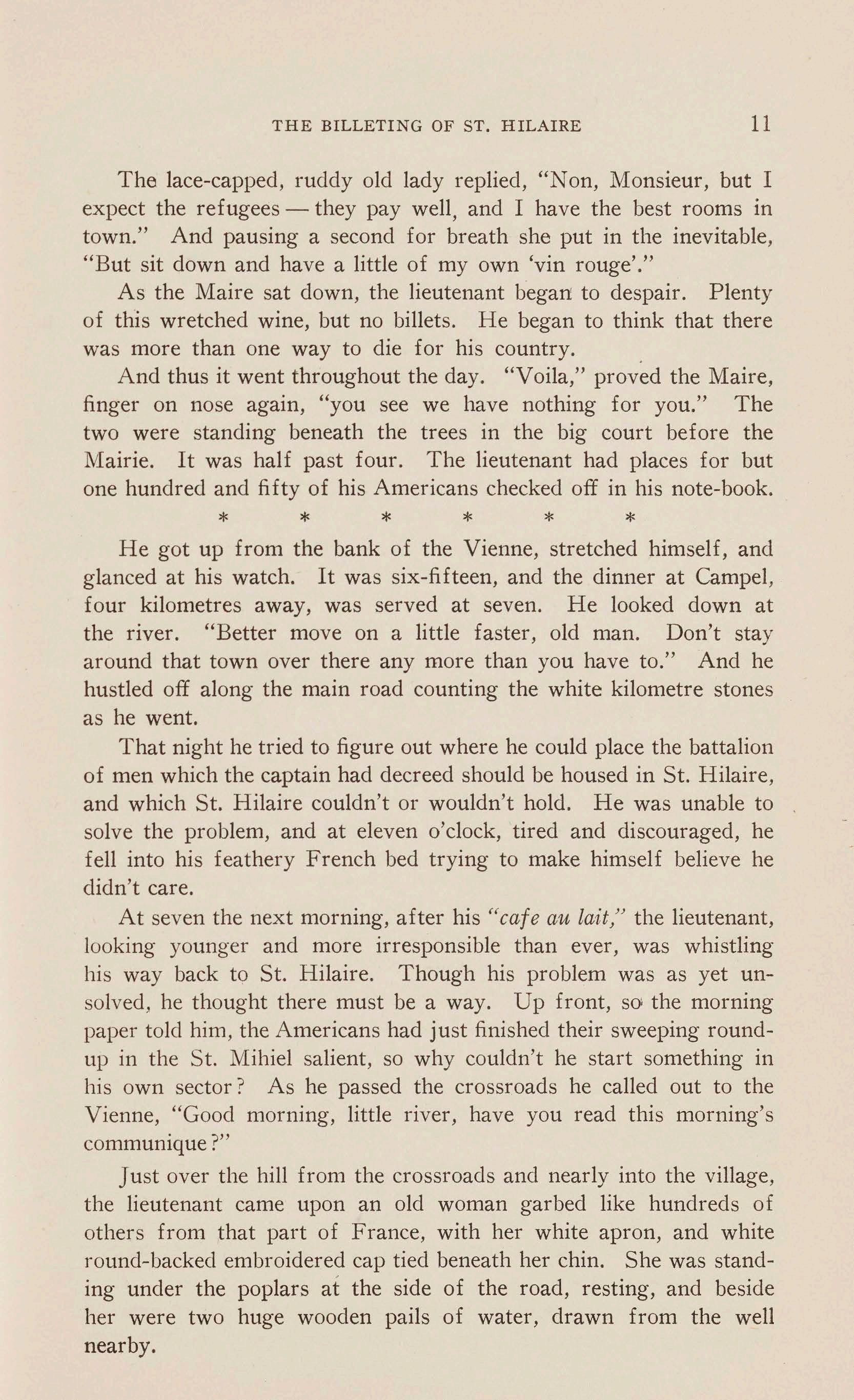
The lace-capped, ruddy old lady replied, "Non, Monsieur, but I expect the refugees -they pay well, and I have the best rooms in town." And pausing a second for breath she put in the inevitable, "But sit down and have a little of my own 'vin rouge'."
As the Maire sat down, the lieutenant began to despair. Plenty of this wretched wine, but no billets. He began to think that there was more than one way to die for his country.
And thus it went throughout the day. "Voila," proved the Maire, finger on nose again, "you see we have nothing for you." The two were standing beneath the trees in the big court before the Mairie. It was half past four. The lieutenant had places for but one hundred and fifty of his Americans checked off in his note-book. * * * * * *
He got up from the bank of the Vienne, stretched himself, and glanced at his watch. It was six-fifteen, and the dinner at Campel, four kilometres away, was served at seven. He looked down at the river. "Better move on a little faster, old man. Don't stay around that town over there any more than you have to." And he hustled off along the main road counting the white kilometre stones as he went.
That night he tried to figure out where he could place the battalion of men which the captain had decreed should be housed in St. Hilaire, and which St. Hilaire couldn't or wouldn't hold. He was unable to solve the problem, and at eleven o'clock, tired and discouraged, he fell into his feathery French bed trying to make himself believe he didn't care.
At seven the next morning, after his "caf e au lait," the lieutenant, looking younger and more irresponsible than ever, was whistling his way back to St. Hilaire. Though his problem was as yet unsolved, he thought there must be a way. Up front, so the morning paper told him, the Americans had just finished their sweeping roundup in the St. Mihiel salient, so why couldn't he start something in his own sector? As he passed the crossroads he called out to the Vienne, "Good morning, little river, have you read this morning's communique?"
Just over the hill from the crossroads and nearly into the village, the lieutenant came upon an old woman garbed like hundreds of others from that part of France, with her white apron, and white round-backed embroidered cap tied beneath her chin. She was standing under the poplars at the side of the road, resting, and beside her were two huge wooden pails of water, drawn from the well nearby.
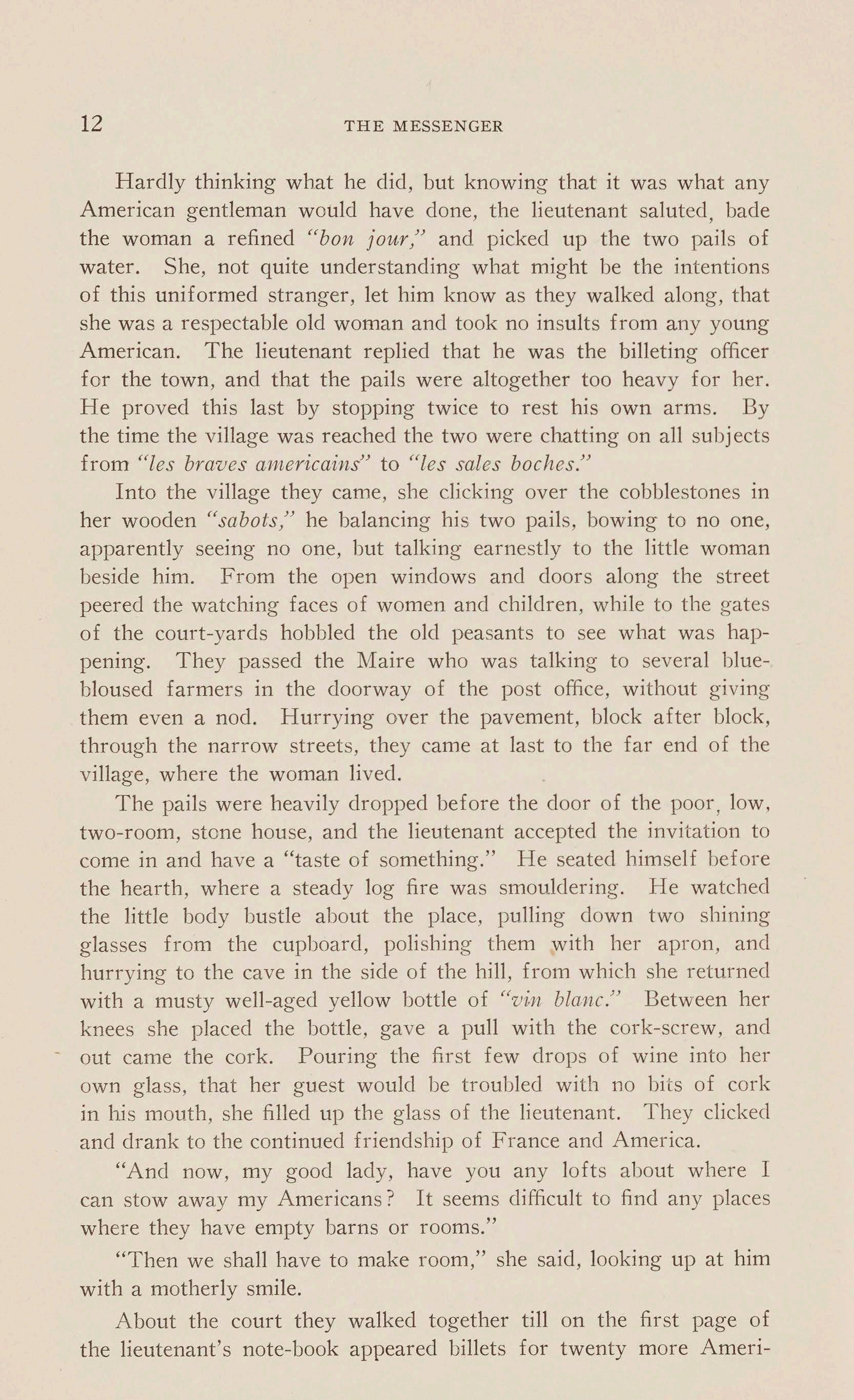
Hardly thinking what he did, but knowing that it was what any American gentleman would have done, the lieutenant saluted, bade the woman a refined "bon jour," and picked up the two pails of water. She, not quite understanding what might be the intentions of this uniformed stranger, let him know as they walked along, that she was a respectable old woman and took no insults from any young American. The lieutenant replied that he was the billeting officer for the town, and that the pails were altogether too heavy for her. He proved this last by stopping twice to rest his own arms. By the time the village was reached the two were chatting on all subjects from "les braves americains" to "les sales boches."
Into the village they came, she clicking over the cobblestones in her wooden "sabots," he balancing his two pails, bowing to no one, apparently seeing no one, but talking earnestly to the little woman beside him. From the open windows and doors along the street peered the watching faces of women and children, while to the gates of the court-yards hobbled the old peasants to see what was happening. They passed the Maire who was talking to several bluebloused farmers in the doorway of the post office, without giving them even a nod. Hurrying over the pavement, block after block, through the narrow streets, they came at last to the far encl of the village, where the woman lived.
The pails were heavily dropped before the door of the poor, low, two-room, stone house, and the lieutenant accepted the invitation to come in and have a "taste of something." He seated himself before the hearth, where a steady log fire was smouldering. He watched the little body bustle about the place, pulling down two shining glasses from the cupboard, polishing them with her apron, and hurrying to the cave in the side of the hill, from which she returned with a musty well-aged yellow bottle of "vin blanc." Between her knees she placed the bottle, gave a pull with the cork-screw, and - out came the cork. Pouring the first few drops of wine into her own glass, that her guest would be troubled with no bits of cork in his mouth, she filled up the glass of the lieutenant. They clicked and drank to the continued friendship of France and America.
"And now, my good lady, have you any lofts about where I can stow away my Americans? It seems difficult to find any places where they have empty barns or rooms."
"Then we shall have to make room," she said, looking up at him with a motherly smile.
About the court they walked together till on the first page of the lieutenant's note-book appeared billets for twenty more Ameri-
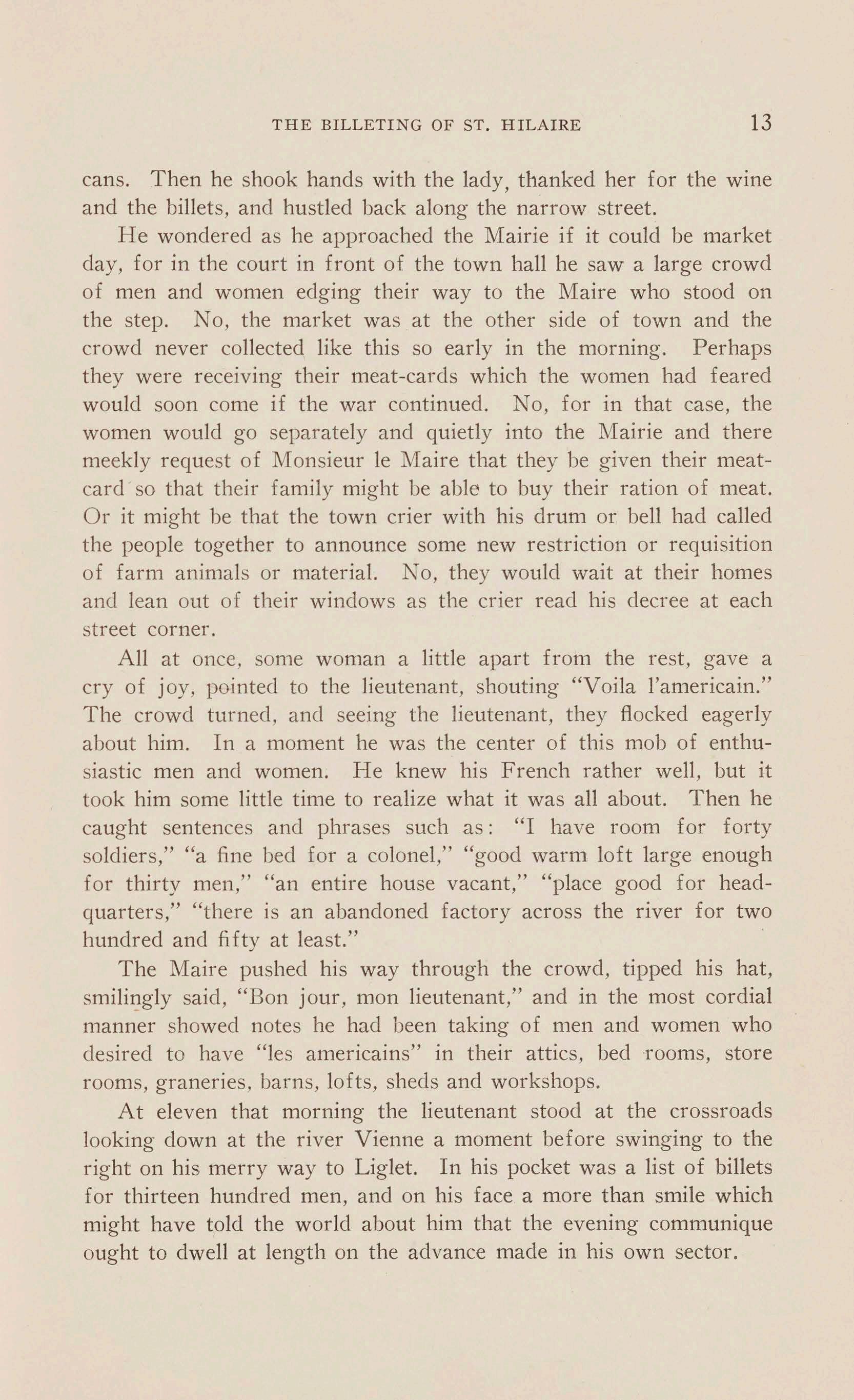
cans. Then he shook hands with the lady, thanked her for the wine and the billets, and hustled back along the narrow street.
He wondered as he approached the Mairie if it could be market day, for in the court in front of the town hall he saw a large crowd of men and women edging their way to the Maire who stood on the step. No, the market was at the other side of town and the crowd never collected like this so early in the morning. Perhaps they were receiving their meat-cards which the women had feared would soon come if the war continued. No, for in that case, the women would go separately and quietly into the Mairie and there meekly request of Monsieur le Maire that they be given their meatcard so that their family might be able to buy their ration of meat. Or it might be that the town crier with his drum or bell had called the people together to announce some new restriction or requisition of farm animals or material. No, they would wait at their homes and lean out of their windows as the crier read his decree at each street corner.
All at once, some woman a little apart from the rest, gave a cry of joy, pointed to the lieutenant, sho utin g "Voila l'americain." The crowd turned, and seeing the lieutenant, they flocked eagerly about him. In a moment he was the center of this mob of enthusiastic men and women. He knew his French rather well, but it took him some little time to realize what it was all about. Then he caught sentences and phrases such as: "I have room for forty soldiers," "a fine bed for a colonel," "good warm loft large enough for thirty men," "an entire house vacant," "place good for headquarters," "there is an abandoned factory across the river for two hundred and fifty at least."
The Maire pushed his way through the crowd, tipped his hat, smilingly said, "Bon jour, mon lieutenant," and in the most cordial manner showed notes he had been taking of men and women who desired to have "les americains" in their attics, bed ·rooms, store rooms, graneries, barns, lofts , sheds and workshops.
At eleven that morning the lieutenant stood at the crossroads looking down at the river Vienne a moment before swinging to the right on his merry way to Liglet. In his pocket was a list of billets for thirteen hundred men, and on his face a more than smile which might have told the world about him that the evening communique ought to dwell at length on the advance made in his own sector.

Thy hair is the gold of the moon-kissed s ea That rises and falls in long, smooth sw e lls ; Thy hair is a glory that dazzles me.
Thy eyes are as cradles of yearning dr eams That mystically rise I know not when c e ; And deep in their depths a flick ' ring light gl e ams.
Thy voice is as soft as the lingering note That quivering swells from a silver lyr eA fitting tenant for thy ivory throat.
Thy lips are as red as flaming desire , And cool and soft a s petals of ro se, And mobile as points of leaping fir e.

BEING
A Drama in One Act Concerning the Painful and Of times Disastrous Indiscretions of this Younger Generation
THE Bov THE GIRL
TIME: The nwdern present.
PLACE: A part of the golf course of any country club.
An idea.l June night with the custoniary full moon reflected on the shimmering surface of a distant lake is discovered when the curtain rises. Bunkers, fairways, and greens roll and tumble off into the misty-gold darkness to a graceful nwuntain skyline. A corner of the club house, br-ightly illuminated, is discernible some distance off to, the left, and the lively strains of the latest fox tro~ are borne faintly to the ears oni the still evening air. The annua.l June Bal Masque is in progress , and has just gotten to the point where the 111,orediscreet chaperones have left in a rage, and those not quite so discreet have either slid under the table or staggered to the s howers. The rest is easy; figure it out for yourself.
THE Bov, wearing the latest London tuxedo (featuring the white double-breasted vest 1iiinus points at tl,e bottom), and THE GIRL, in a costumlet admirably suited to ballet purposes, enter fro11-i the left. Both wear dominoes. They spy a deserted bench _conveniently shaded by heavy boxwoods, and start for it.
THE GIRL ( coyly , measuring her step to his and clinging sweetly to his arm - boys a.lways fa1l for that) : Honest, I think you are the dearest one to bring me away from that stickey old party. I was never so bored in my life.
( The truth of the matter is that it was about as wild as he ever hoped to see, but this heavenly vision at his side was frmn Hollywoo d, and, of course, knew a genuine "party" when she saw one.)
THE Bov: Yeah, I could see that you weren't getting much kick out of it, either, and as I wa~ jus~ dying for a little chat with you, I though we might sit out a few. How about that bench right over there?
I :f
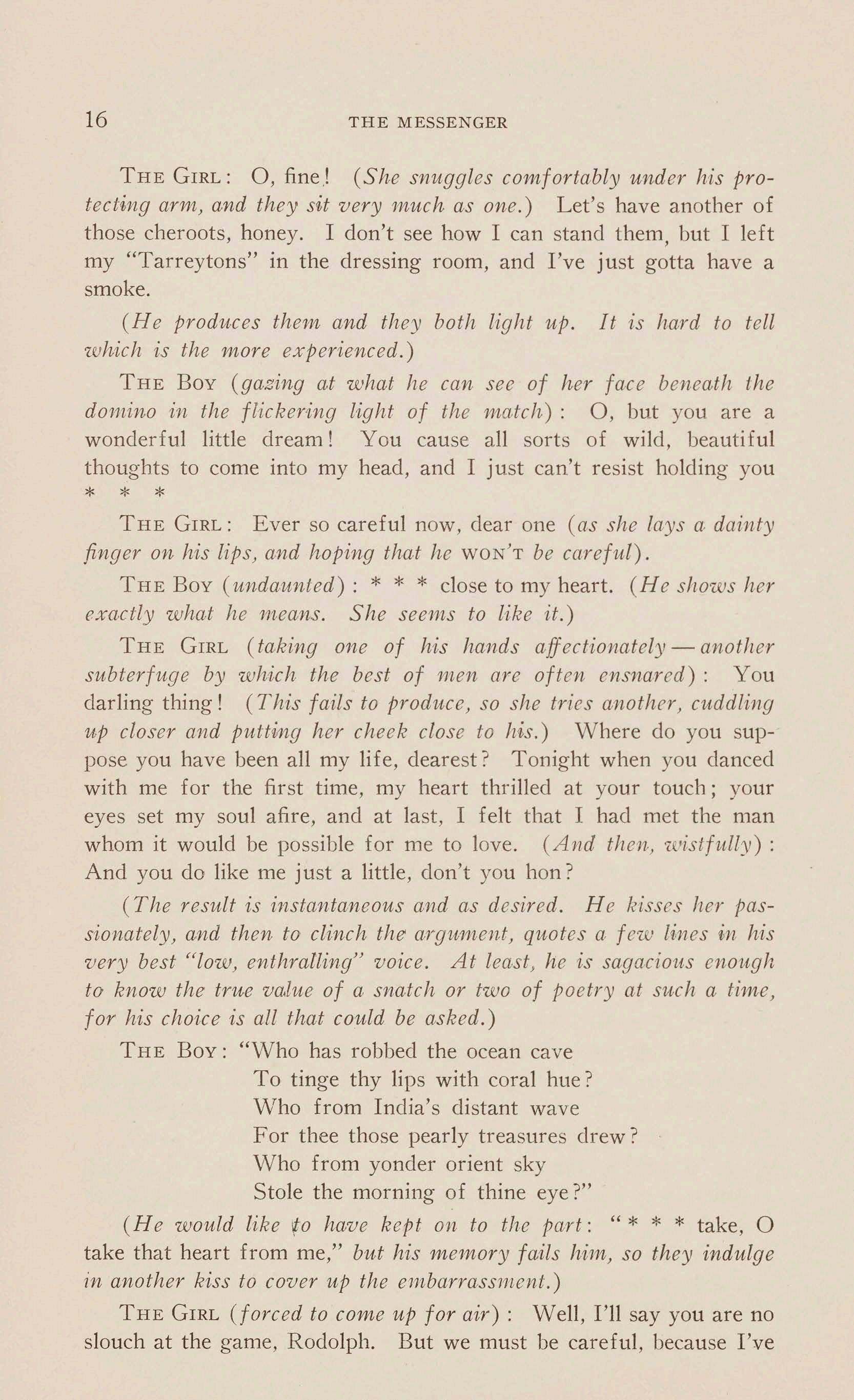
THE GIRL: 0, fine.! (She snuggles comfortably under his protecting arm, and they sit very much as one.) Let's have another of those cheroots, honey. I don't see how I can stand them, but I left my "Tarreytons" in the dressing room, and I've just gotta have a smoke.
(He produces them and they both light up. It is hard to tell which is the more experienced.)
THE Boy (gazing at what he can see of her face beneath the domino in the flickering light of the nwtch): 0, but you are a wonderful little dream! You cause all sorts of wild, beautiful thoughts to come into my head, and I just can't resist holding you * * *
THE GIRL: Ever so careful now, dear one (as she lays a dainty finger on his lips, and hoping that he WON'T be careful).
THE BoY (undaunted): * * * close to my heart. (He shows her exactly what he nieans. She seems to like it.)
THE GIRL ( taking one of his hands affectionately - another subterfuge by which the best of nien are often ensnared) : You darling thing! (This fails to produce, so she tries another, cuddling up closer and puttvng her cheek close to his.) Where do you suppose you have been all my life , dearest? Tonight when you danced with me for the first time, my heart thrilled at your touch ; your eyes set my soul afire, and at last, I felt that I had met the man whom it would be possible for me to love. (And then, 'Wistfully): And you do like me just a little, don't you hon?
( The result is instantaneous and as desired. He hisses her passionately, and then to clinch the argument, quotes a few lines in his very best "low, enthralling" voice. At least , he is sagacious enough to know the true value of a snatch or two of poetry at such a time, for his chofre is all that could be asked.)
THE Boy: "Who has robbed the ocean cave
To tinge thy lips with coral hue? ~rho from India's distant wave
For thee those pearly treasures drew? Who from yonder orient sky Stole the morning of thine eye?"
(He would like ¢a have kept on to the part : " * * * take, 0 take that heart from me," but his memory fails him, so they indulge in another kiss to cover up the embarrassment.)
THE GIRL (forced to come up for air) : Well, I'll say you are no slou ch at the game, Rodolph. But we must be careful, because I've
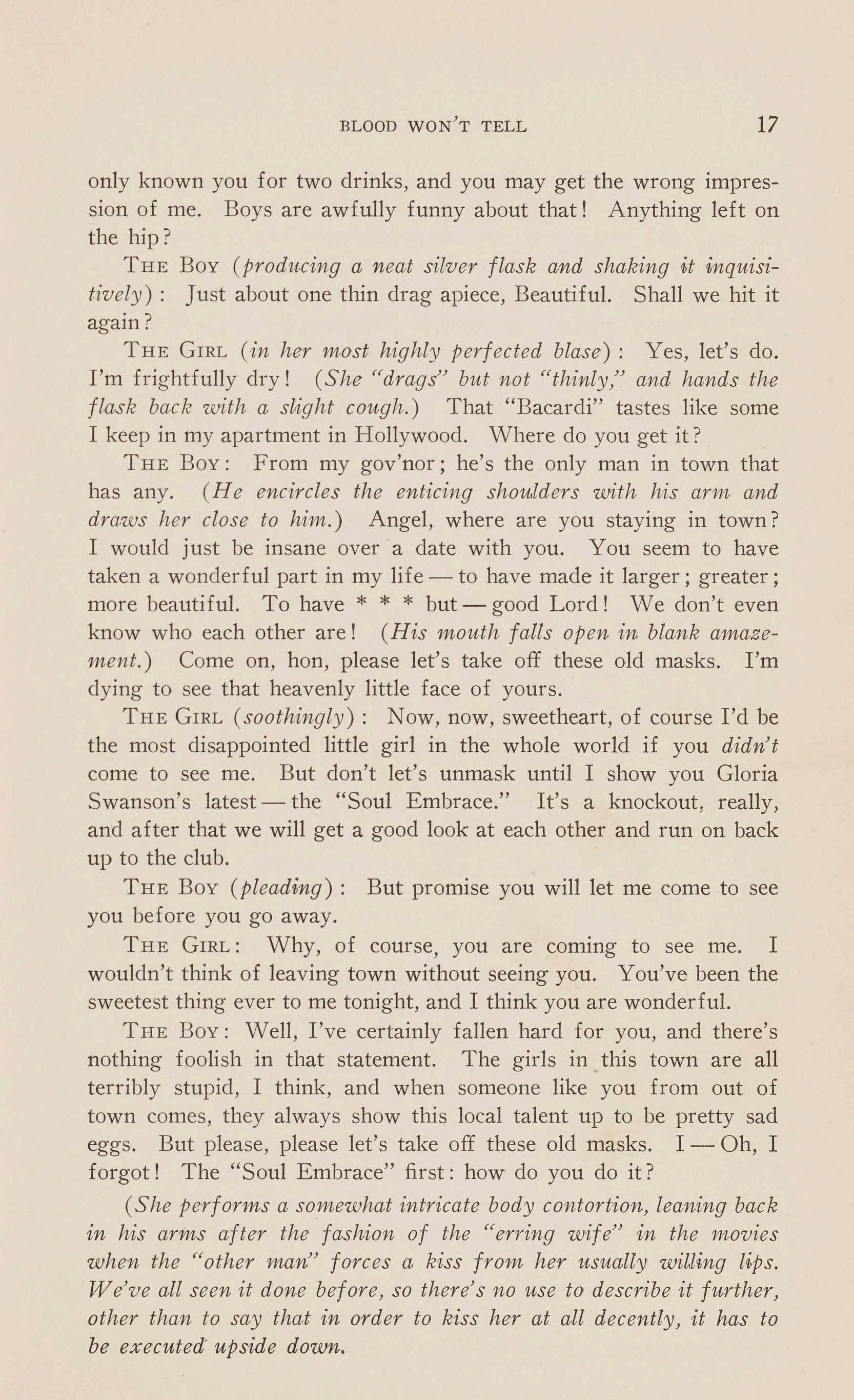
only known you for two drinks, and you may get the wrong impression of me. Boys are awfully funny about that! Anything left on the hip?
THE Boy (producing a neat silver flask and shaking it inquisitively) : Just about one thin drag apiece, Beautiful. Shall we hit it again?
THE GIRL ( in her most highly perfected blase) : Yes, let's do. I'm frightfully dry! (She "dragsJJ but not "thinly," and hands the flask bacl? 'With a slight cough.) That "Bacardi" tastes like some I keep in my apartment in Hollywood. Where do you get it?
THE BoY: From my gov'nor; he's the only man in town that has any. (He encircles the enticing shoulders with his arm and draws her close to him.) Angel, where are you staying in town? I would just be insane over a date with you. You seem to have taken a wonderful part in my life -to have made it larger; greater; more beautiful. To have * * * but - good Lord! We don't even know who each other are! (His mouth falls open in blank amazement.) Come on, hon, please let's take off these old masks. I'm dying to see that heavenly little face of yours.
THE GIRL (soothingly): Now, now, sweetheart, of course I'd be the most disappointed little girl in the whole world if you didn't come to see me . But don't let's unmask until I show you Gloria Swanson's latest -the "Soul Embrace." It's a knockout, really, and after that we will get a good look at each other and run on back up to the club.
THE BoY (pleadiing) : But promise you will let me come to see you before you go away .
THE GIRL: Why, of course, you are coming to see me. I wouldn't think of leaving town without seeing you. You've been the sweetest thing ever to me tonight, and I think you are wonderful.
TI-IE BoY: Well, I've certainly fallen hard for you, and there's nothing foolish in that statement. The girls in this town are all terribly stupid, I think, and when someone like you from out of town comes, they always show this local talent up to be pretty sad eggs. But please, please let's take off these old masks. I -Oh, I forgot! The "Soul Embrace" first: how do you do it?
(She performs a somewhat intricate body contortion, leaning back in his arms after the fashion of the "erring wif eJJ in the movies when the "other manJJ forces a kiss from her usually 'Willing lips. We've all seen it done before, so there's no use to describe it further, other than to say that in order to kiss her at all decently, it has to be executed· upside down.

They botlt seeni to like Gloria 1 s method of greeting, or good-bye, -whichever it 1nay be - or it may be both - and, go down i11a long caress lasting for every bit of ninety seconds. The previous record of either was not better than forty-e ,ight flat. H e finally gives in mid ex tracts himself from her efficient half-Nelson with a gasp).
THE Bov: Whew! Hot stuff! ! Where did you learn that? I never saw any one with such perfect technique!
THE GIRL (nonchalantly rearranging her hair) : \Veil, dear boy, ] see you aren't exactly made of wood yourself. You are just the world's sweetest, and you do the "Soul Embrace" divinely.
THE Bov (a.ll exc-itement): 0, I can't wait another minute! Please, let's unmask.
THE GIRL: I'm dying with curiosity to see you, too, but we'll have to do it prettily. Suppose we turn our backs, count three, and then snatch them off.
THE Bov: Fine! Don't let's count but two." (They turn their backs to each other and take hold of the-ir dorninoes, ready to tear them off at the final count.)
THE GIRL (counting): One, oooooh ! I can hardly wait! ( Claps her hand estatically.)
THE Bov (pleading impatiently) : Please, please hurry! I'll go up in smoke in another second.
THE GIRL: Two-o-o (pauses, and then quick,ly) three!
( With one a.ccord they tear off the masks, turn, and start into each other 1 s outstretched . arms, and then stop abruptly; mouths agape, and eyes wide.)
THE Bov: Harriett! ! !
THE GIRL: Johnnie!!!
( They sink to the bench completely dazed.)
THE Bov (faintly): My own sister!
THE GIRL (faintly): My own brother!
BOTH ( very, very faint,ly- in fact, scarcely audible) : MY GOD!!
SLOW CURTAIN

GEORGE REYNOLDS FREEDLEY
Miss Gertrude Stein is an American, who now lives in Paris , the Paris of Piccaso and Matisse and Davidson. She began her literary career with realistic novels written in a conventional enough manner. A few years ago, she startled the world with "Tender Buttons," with the subtitle "Food, Objects, Room." This collection of mysterious prose sketches brought down upon itself a storm of ridicule and ill-concealed indignation. However , there was some admiration for these literary still-lifes in the manner of the painters and sculptors I have mentioned, in addition , of course, to Braque. It is necessary to have at least a superficial knowledge of the work of these men to adjudge Miss Stein ' s own peculiar literary composition. This form of painting and sculpture has been made familiar t o the American artistic public by the critical writings of Mr. Clive Bell. Two years ago Miss Stein published "Geography and Plays ," and since then has been silent with the exception o f these strange prosepoems , or prose sketches , which have been published in various advanced magazines.
Miss Stein is the center of much heated controversy as to whether her work is sincere and fine; or whether she is toying with Dadaism; or whether she has developed literary insanity; or whether she is perpetrating an immense hoax. If I were old and wise instead of young and foolish and fond of controversy, I should avoid her work as a plague. There is no basis of real criticism for her prose poetry, which is entirely unique, and thus reputable critics who are afraid that the public will understand their fundamental weaknesses avoid her, with but few exceptions. With this preface, I delve into her magazine material, my only basis for criticism.
The most facile attitude is that of ridicule, but the very easiness of that line of attack has made me suspicious of its advisability. In the infancy of a new genre, it is always easier and far more scholarly to disapprove. The proponent is always. in the less tenable position, generally because he feels that he knows so very little about the new form that it is almost hopeless to wage a real fight for it, though in all probability he knows more concerning it than do its ridiculers
To say that Miss Stein is merely a follower of Dadaism is a possible attitude but hardly probable. The desire of this group is to ridicule, to burlesque everything. This movement has produced the

spool statues in derision for the early African sculpture, the box monuments in an effort to hold to ridicule the excesses of the Post-Cubists and certain of the Vorticists and several of the Futurists. The writer's supremely serious attitude is hardly compatible with the new magazine, "Aesthetics," the latest Dadaistic gesture; from this country this time. There is no one in the literary field comparable with Miss Stein, which would force her to ridicule herself, a highly improbable thesis when we consider her eminent seriousness.
It is possible to declare that the writer is literarily insane. This attitude is easy to take because there is no possible argument to advance against it. Literary insanity is merely differing from the literary forms of others, and hence every proponent of every new form is bound to be insane, in so much as he differs from the literary standard. Possibly it is not right to doubt the sincerity of those who hold this view, or pretend to hold it. Nevertheless it is a temptation, as this person is henceforth secure against any possible argument, no matter how plausible, until that time when the reality of the form is recognized and understood, and then he is probably dead and long buried.
There is also the possibility that she is perpetrating a huge hoax on the critics and literary public. This I do not deem plausible because of her past attitude toward literature. The fact that so eminent a writer as Mr. Sherwood Anderson i~ an advocate of her prose-poetry is additional guarantee that her work is serious. He says in an article in The Little Review, that highstepping and once flamboyant periodical devoted to the Arts :
"She gives words an oddly new, intimate flavor and , at the same time makes familiar words seem almost like strangers. For me the work of Gertrude Stein consists in a rebuilding, an entire recasting of life, in the city of. words. Here is one artist who has been ready to accept ridicule, who has even forgone the privilege of writing the great American novel, uplifting our English speaking stage and wearing the bays of the great poets to go live among the little housekeeping words, the swaggering street-corner words, the honest working, money-saving words and all the other forgotten and neglected citizens of the sacred and half-forgotten city."
There is a problem in the minds of many as to whether her work should be called pure prose or prose-poetry. I lean toward the latter attitude, though many hold diverging opinions, that of which Vanity Fair is conspicuous. This publication always leans to the idea that she is writing pure prose and always refers to it in that
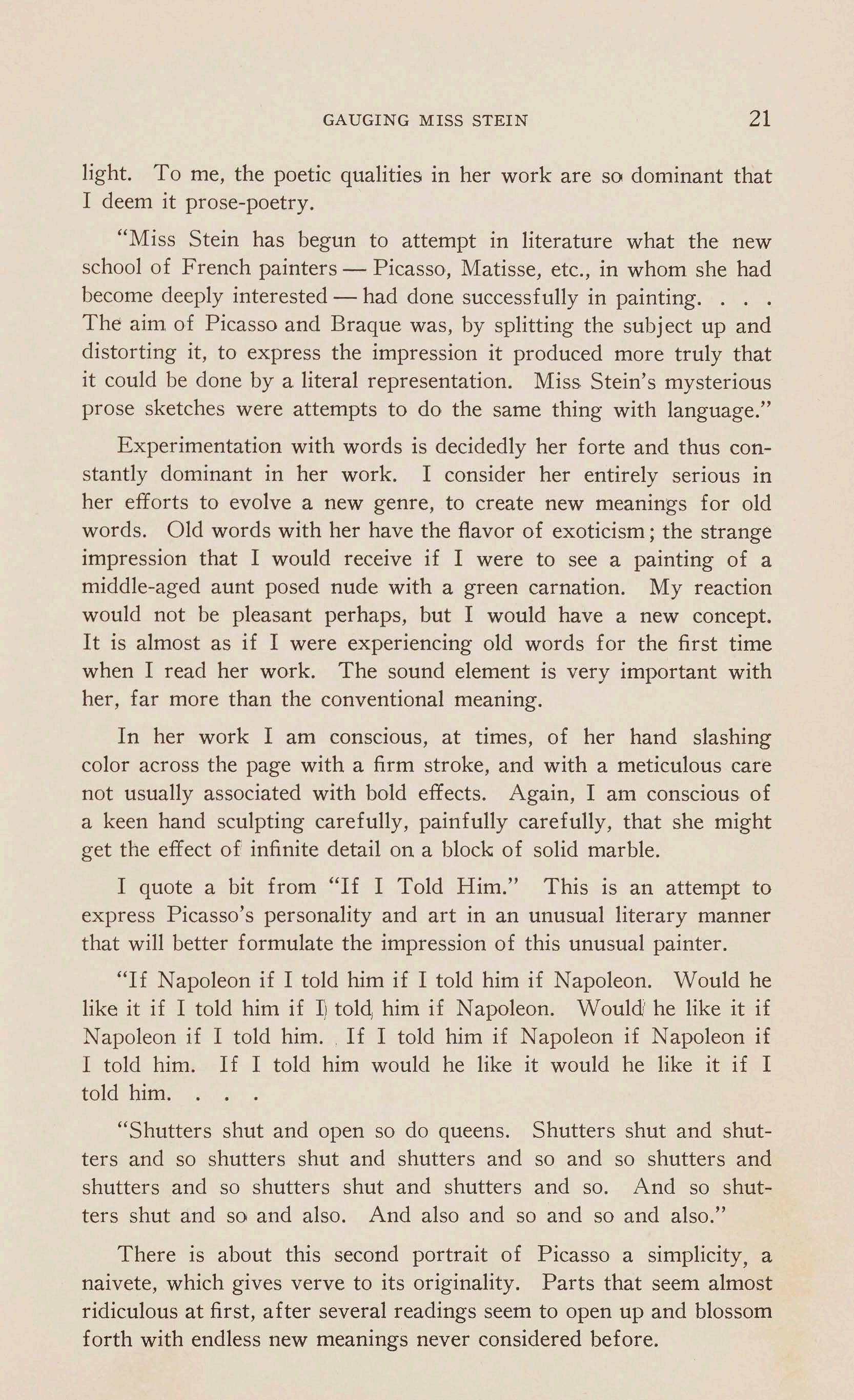
light. To me, the poetic qualities in her work are so dominant that I deem it prose-poetry.
"Miss Stein has begun to attempt in literature what the new school of French painters -Picasso, Matisse, etc., in whom she had become deeply interested -had done successfully in painting. . . . The aim of Picasso and Braque was, by splitting the subject up and distorting it, to express the impression it produced more truly that it could be done by a literal representation. Miss Stein's mysterious prose sketches were attempts to do the same thing with language."
Experimentation with words is decidedly her forte and thus constantly dominant in her work. I consider her entirely serious in her efforts to evolve a new genre, to create new meanings for old words. Old words with her have the flavor of exoticism; the strange impression that I would receive if I were to see a painting of a middle-aged aunt posed nude with a green carnation. My reaction would not be pleasant perhaps, but I would have a new concept. It is almost as if I were experiencing old words for the first time when I read her work. The sound element is very important with her, far more than the conventional meaning.
In her work I am conscious, at times, of her hand slashing color across the page with a firm stroke, and with a meticulous care not usually associated with bold effects. Again, I am conscious of a keen hand sculpting carefully, painfully carefully, that she might get the effect of infinite detail on a block of solid marble.
I quote a bit from "If I Told Him." This is an attempt to express Picasso's personality and art in an unusual literary manner that will better formulate the impression of this unusual painter.
"If Napoleon if I told him if I told him if Napoleon. Would he like it if I told him if T1told, him if Napoleon. Would ' he like it if Napoleon if I told him . . If I told him if Napoleon if Napoleon if I told him. If I told him would he like it would he like it if I told him.
"Shutters shut and open so do queens. Shutters shut and shutters and so shutters shut and shutters and so and so shutters and shutters and so shutters shut and shutters and so. And so shutters shut and so and also. And also and so and so and also."
There is about this second portrait of Picasso a simplicity, a naivete, which gives verve to its originality. Parts that seem almost ridiculous at first, after several readings seem to open up and blossom forth with endless new meanings never considered before.

While not as interesting, because she is not as at home with literary people as with painters and sculptors, her portraits of writers deserve some quotation. I shall give a bit from her treatment of Van Vechten, also in a second portrait. She terms this "Van or Twenty Years After," her titles somehow suggest the lines of "Pierot" in Edna Saint Vincent Millay's "Aria da Capo," a similitude that would cause horror to Miss Stein no doubt if she should ever hear of the comparison.
"Tied and untied and that is all there is about it. And as tied and as beside, and as beside and tied. Tied and untied and beside and as beside and as untied and as tied and as untied and as beside. As beside as by and as beside. As by as by the day. By their ' day and as it may, may be they will may be they may. Has it been reestablished as not to weigh. Weigh how. How to weigh. Or weigh. Weight, state, await, state, late state, rate state, state await weight state, in state rate at any rate state weight state as stated. Only as if when six each one in that direction so as to speak look down and see the same as weight. As weight for weight as state to state as wait to wait as not so. Beside."
I have tried to make my attempt to guage Miss Stein as fair as possible. I really hold no brief either way. Possibly I may seem to side tacitly with her, as my paper in certain of its phases can be termed a defense. This is due to the fact that most people condemn her work without the least attempt to go deeply enough into it to ascertain its true value. She is still experimenting and endeavoring to discover her true mileu, now that she has cut herself adrift from conventional writing. I, for one, demand fair criticism and shall watch with interest Miss Stein's development.

A. JUDSON EVANS
To have entered public high school in 1914, the year of the turmoil in Europe, presager of cantonment camps, Liberty Bond drives, and cost-plus construction, should have given Stephen C. Baxter the rating of a member in good standing of the "younger g en eration. " It is possible that the time of his advent into learning and long trousers on his thirteenth birthday may have had something to do with it. He was long legged and looked older than he waswhich may have also had something to do with subsequent happenings.
Things were rather quiet in 1914. There was hardly an argument as to whether one should hope the Germans would get beaten to death or not . The war seemed as remote as the Balkan disturbance s . S ociologically youth was calm.
Scott Fitzgerald wa s only about sixteen and probably afraid t o say an ything ab out the petting which went on even then perhaps. Ce rtainl y, one hardly dared speculate on such things. Stephen had n ot long since read David Copperfield and had any of the high school set landed upon Ben Hecht, the "devastating" one from Chicago w ould probably have been classed with the French photograph of ny mph es du pave. One hardly dared own them for fear of detection. In a conservative community prosperou s enough to be thoroughly stabilized , y outh remained in that condition which their parent~ th oug ht was Victorian .
Stephen was too heft y a lad to have cherished Sir Gawain as a hero , but life had treated him rather kindly and , at the time , it seemed a rather good idea to love one woman , cleave to her and by, years of noble deeds strive to attain her. He was, in a shorter sentence, ready-made for the wiles of the first ox-eyed Helen who pas sed a neatly folded note to him in study hall.
Juli a was a jewel, or better and no more trite , she was an innocent countr y girl , fifteen, fickle and fair. Perhaps the influence of fifteeny ear- old girls on history ha s n ot been adequately treated. Shakesp eare is criti cized for making Juliet a maid of fourteen flower y summers, but the Bard was probably right as usual , as events in the tra g ic hi st or y of Stephen and Julia might seem to indicate.
Picture then, if you ' re mean enough, a broad corridor in a high school, with composition flooring, slick as glass, and cloak rooms in which many a rendezvous had been kept, many a troth plighted and many a lie sighed. Hero and heroine are sixteen and fifteen, re-

spectively, with the extra age for the boy. Julia brushes by as the youth, at the time a gridiron hero of renown, was charging out of the cloak room to make a dash for the lunch counter downstairs. Julia was almost toppled over by the impact. The sensation of saving her from the floor was not unpleasant. Dr. Freud would say more, but suffice it that the dendrites in his arms conveyed to his brain cells a new sensation, to wit: maiden in arms plus knight at arms. As Laurence Sterne has so lucidly expressed it, "we blush to say so," but we find our hero actually enjoying the sensation. But he did the manlY' thing, bowed and went on his way.
Two-thirty o'clock when classes ended, the knight and ladye were "detained after school" for minor infractions of the code of conduct. Stephen was studying Spanish grammar on the theory that the 30 minutes penal servitude would pass more rapidly that way. Soon he found that by some intervention of providence, or some plot by Aphrodite, judicious Julia happened to be seated behind him.
She had heard that Frances had kicked him. And she could not understand why Frances had such unutterably bad taste. He agreed that Frances' judgment never had been good and so on until it ended by his walking home with her and carrying the books, indicating to the world that he was her knight at arms.
Walking home with a girl is bad enough, but to stop by her home and hear her play the piano is, if anything, worse.
If you were ever young, you will know that the faculties which distinguish great men from their fellows are those which enable a young man of fairly affectionate proclivities to remain in character as a Chesterfield, while a damsel plays "Love, Here Is My Heart," "Forgotten" and "Absent," to say nothing of "Pale Hands" -and not attempt to find out whether the young lady has ever really been understood in all her life.
To the credit of Stephen let it be said that he had courage and yet remained distant, for in 1914, things were different. Here's how different: there were maidens who would pet, but it was infrequent enough to warrant issuing a bulletin at the Hi-Y Club the following Friday if one could hold the hand of a girl through a muff, while Norma Talmage and Eugene O'Brien went through the death grapple on the movie screen. Soon after, however, it became common talk and young men of accomplishment no longer considered such things worthy of note except to recount to a few others who were also engaged in investigating problems -principally girls.
Julia was a Girl Scout, and as such it was not unusual for her to be among those who went off into the woods on Saturday tr1
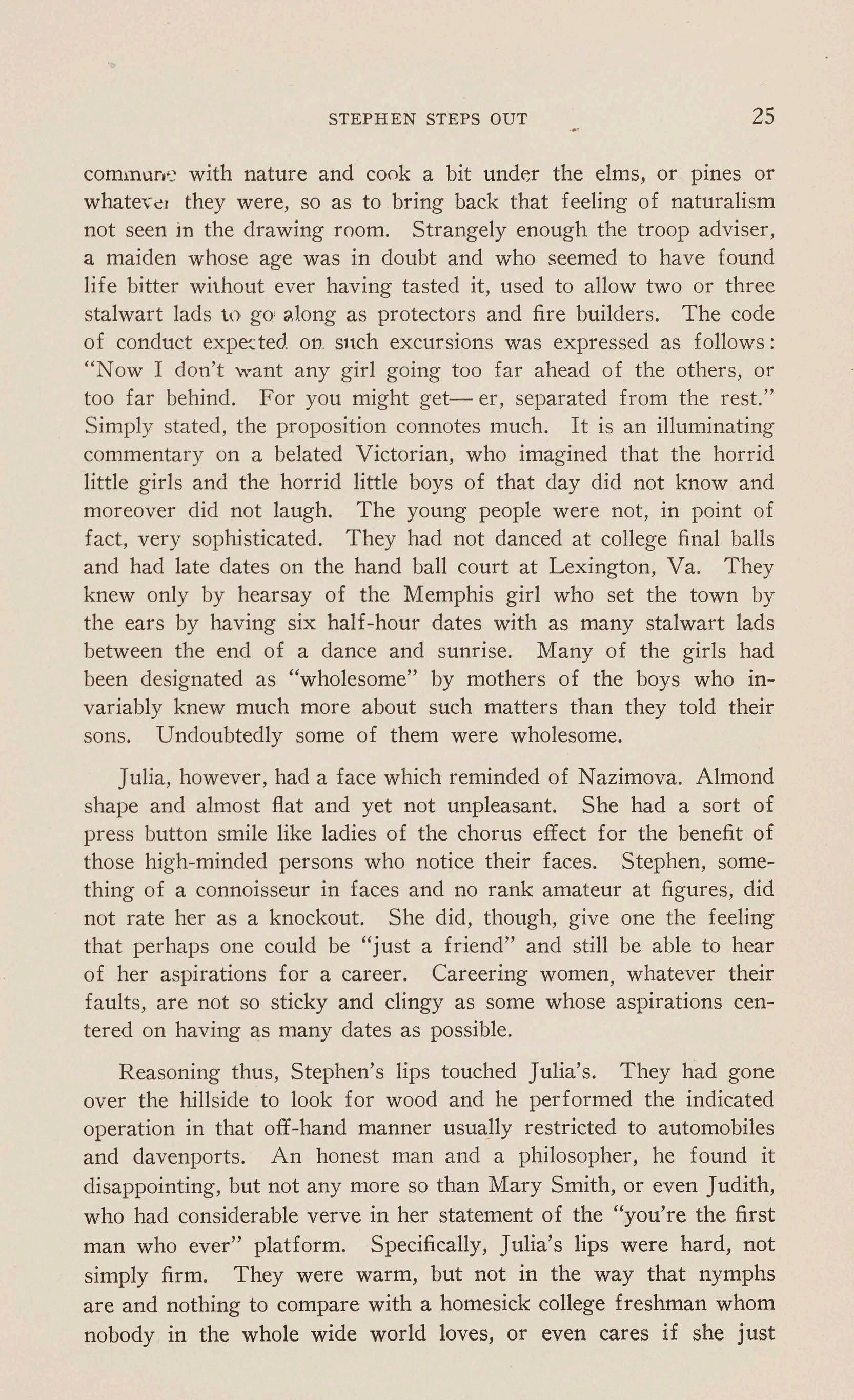
comrnur,•~ with nature and cook a bit under the elms, or pines or whate,cr they were, so as to bring back that feeling of naturalism not seen in the drawing room. Strangely enough the troop adviser, a maiden whose age was in doubt and who seemed to have found life bitter without ever having tasted it, used to allow two or three stalwart lads w go .i.long as protectors and fire builders. The code of conduct expe:ted. on snch excursions was expressed as follows: "Now I don ' t want any girl going too far ahead of the others, or too far behind. For you might get-er, separated from the rest." Simply stated, the proposition connotes much. It is an illuminating commentary on a belated Victorian, who imagined that the horrid little girls and the horrid little boys of that day did not know and moreover did not laugh. The young people were not, in point of fact, very sophisticated. They had not danced at college final balls and had late dates on the hand ball court at Lexington, Va. They knew only by hearsay of the Memphis girl who set the town by the ears by having six half -hour dates with as many stalwart lads between the end of a dance and sunrise. Many of the girls had been designated as "wholesome" by mothers of the boys who invariably knew much more about such matters than they told their sons. Undoubtedly some of them were wholesome.
Julia, however, had a face which reminded of Nazimova. Almond shape and almost flat and yet not unpleasant. She had a sort of press button smile like ladies of the chorus effect for the benefit of those high-minded persons who notice their faces. Stephen, something of a connoisseur in faces and no rank amateur at figures, did not rate her as a knockout. She did, though, give one the feeling that perhaps one could be "just a friend" and still be able to hear of her aspirations for a career. Careering women, whatever their faults, are not so sticky and clingy as some whose aspirations centered on having as many dates as possible.
Reasoning thus, Stephen's lips touched Julia's. They had gone over the hillside to look for wood and he performed the indicated operation in that off -hand manner usually restricted to automobiles and davenports. An honest man and a philosopher, he found it disappointing, but not any more so than Mary Smith, or even Judith, who had considerable verve in her statement of the "you're the first man who ever" platform. Specifically, Julia's lips were hard, not simply firm. They were warm, but not in the way that nymphs are and nothing to compare with a homesick college freshman whom nobody in the whole wide world loves, or even cares if she just
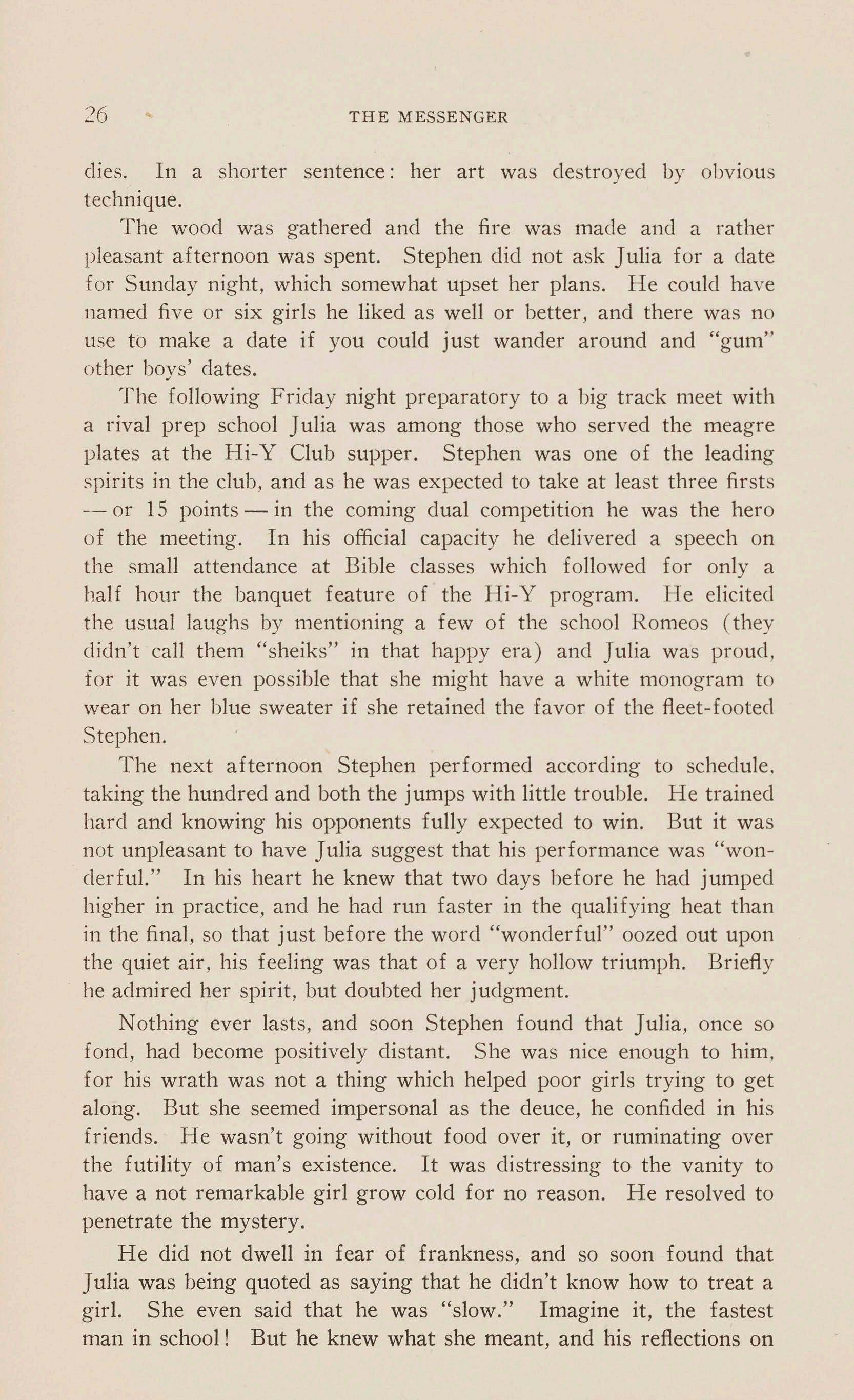
dies. In a shorter sentence: her art was destroyed by obvious technique.
The wood was gathered and the fire was made and a rather pleasant afternoon was spent. Stephen did not ask Julia for a elate for Sunday night, which somewhat upset her plans. He could have named five or six girls he liked as well or better, and there was no use to make a elate if you could just wander around and "gum" other boys' dates.
The following Friday night preparatory to a big track meet with a rival prep school Julia was among those who served the meagre plates at the Hi-Y Club supper. Stephen was one of the leading spirits in the club, and as he was expected to take at least three firsts or 15 points -in the coming dual competition he was the hero of the meeting. In his official capacity he delivered a speech on the small attendance at Bible classes which followed for only a half hour the banquet feature of the Hi-Y program. He elicited the usual laughs by mentioning a few of the school Romeos ( they didn't call them "sheiks" in that happy era) and Julia was proud , for it was even possible that she might have a white monogram to wear on her blue sweater if she retained the favor of the fleet-footed Stephen.
The next afternoon Stephen performed according to schedule. taking the hundred and both the jumps with little trouble. He trained hard and knowing his opponents fully expected to win. But it was not unpleasant to have Julia suggest that his performance was "wonderful." In his heart he knew that two clays before he had jumped higher in practice, and he had run faster in the qualifying heat than in the final, so that just before the word "wonderful" oozed out upon the quiet air, his feeling was that of a very hollow triumph. Briefly he admired her spirit, but doubted her judgment.
Nothing ever lasts, and soon Stephen found that Julia, once so fond, had become positively distant. She was nice enough to him. for his wrath was not a thing which helped poor girls trying to get along. But she seemed impersonal as the deuce, he confided in his friends. He wasn't going without food over it, or ruminating over the futility of man's existence. It was distressing to the vanity to have a not remarkable girl grow cold for no reason. He resolved to penetrate the mystery.
He did not dwell in fear of frankness, and so soon found that Julia was being quoted as saying that he didn't know how to treat a girl. She even said that he was "slow." Imagine it, the fastest man in school! But he knew what she meant, and his reflections on

,y the "frails," as he called them, \\'.~e~o .s.._pleasa t- lr-I<flv~',1, -.;, was he? No, he wasn't slow, hl ~ot ,teg, J he._rf'- particular, Julia was a dish-faced doll! ··- ½
Imagine the reflections of an idealistic youth who truly believed that a girl had made fun of him because he didn't pet her, or as the crude youths remarked in the vigor of a gymnasium and hot shower bath he "oughter neck the hips off 'er." Three members of the track squad sang out above the sound of the water : "I've taken my fun where I've found it; I've rogued and I've ranged in my time; I've had my pickin's o' sweethearts and four of the lot they wuz prime. One was an arf cast widow, etc."
The scene shifts to the conventional mahogany piano bench lighted by the inevitable old rose floor lamp. The action opens at the point where, after discussing what her music professor has said about art, Julia has remarked to Stephen that she would never marry. Nobody had asked her -certainly not Stephen, who was nothing if not cautious. She would go upon the concert stage, and although she might come to the Fannie Hurst occasional-breakfast-with-yourhu sba nd notion she would be truly wedded only to Art. Conversation might have gone as far as the query, "Can a man love more than one woman in his life?", but Stephen shifted the tone of the talk to the latest crushes in the school as evidenced by surrepticious elates in the library.
The week 's beau geste had been in the form of a note to John, one of the romantic figures of the school, nice parlor tenor and intriguing eyes -from an English teacher. This lady, who did not take !if e with that excessive seriousness prevalent in high school pedagogy, upon seeing John "making time" with a maid of fourteen wrote upon a card: "All my books were woman's looks and folly's all they've taught me. " John had laughed and saved himself from being ridiculou s.
Conversation can only go so far. It is a safe bet that Cleopatra didn ' t talk them to death. Similarly tremulous ingenues do not , unfortunately, restrict themselves to verbal felicity and bantering of wit which we are led to hope was the custom among our elders. They shifted to the davenport , and it soon developed that Julia felt "low." This is to say she gave one of the universal signs, the others being "let's walk out on the beach during intermission and listen to the waves" and "why not drive down on the viaduct and look at the water?"
The harrowing details are unnecessary. Julia was manhandled considerably under the guise of being sympathized with. Just to

make believe was better than not being loved at all. She was kissed something over a hundred times in a manner which was noted by Ben Jonson as not conducive to good morals. She was couchant and palpitant -both at a considerable sacrifice of dignity and womanly poise.
The following day came, as days are won't to do, and with it the rapid strides around the cinder track and the invigorating shower. Donald, the school poet, approaches. Stephen remembers the substance of high romance and says: "Oh, you were right about our musical friend. She is a warm baby. Oughter go up some time. And when you do, tell her you heard I was slow as molasses in winter and see what she says."
"I am, you remember," he continued, "the citizen she publicly proclaimed a dumbell. And now that technically I am a wise guy I feel that really I'm a fool."
w. A. SHELL, JR.
From murky blackness, stifling air, Emerging forth; discovering light 'Mid crying gasps and vainest prayer That God would immolate her, quite: A flash of phosphorescent night Conglamorous shades and hues aflare; Then total darkness, split by fire, And strangling cries from choking mire.
From out of Hell a life returns. The clouds of death are rolled away, The fire of pain no longer burns; And God has wrapped a soul in clay.
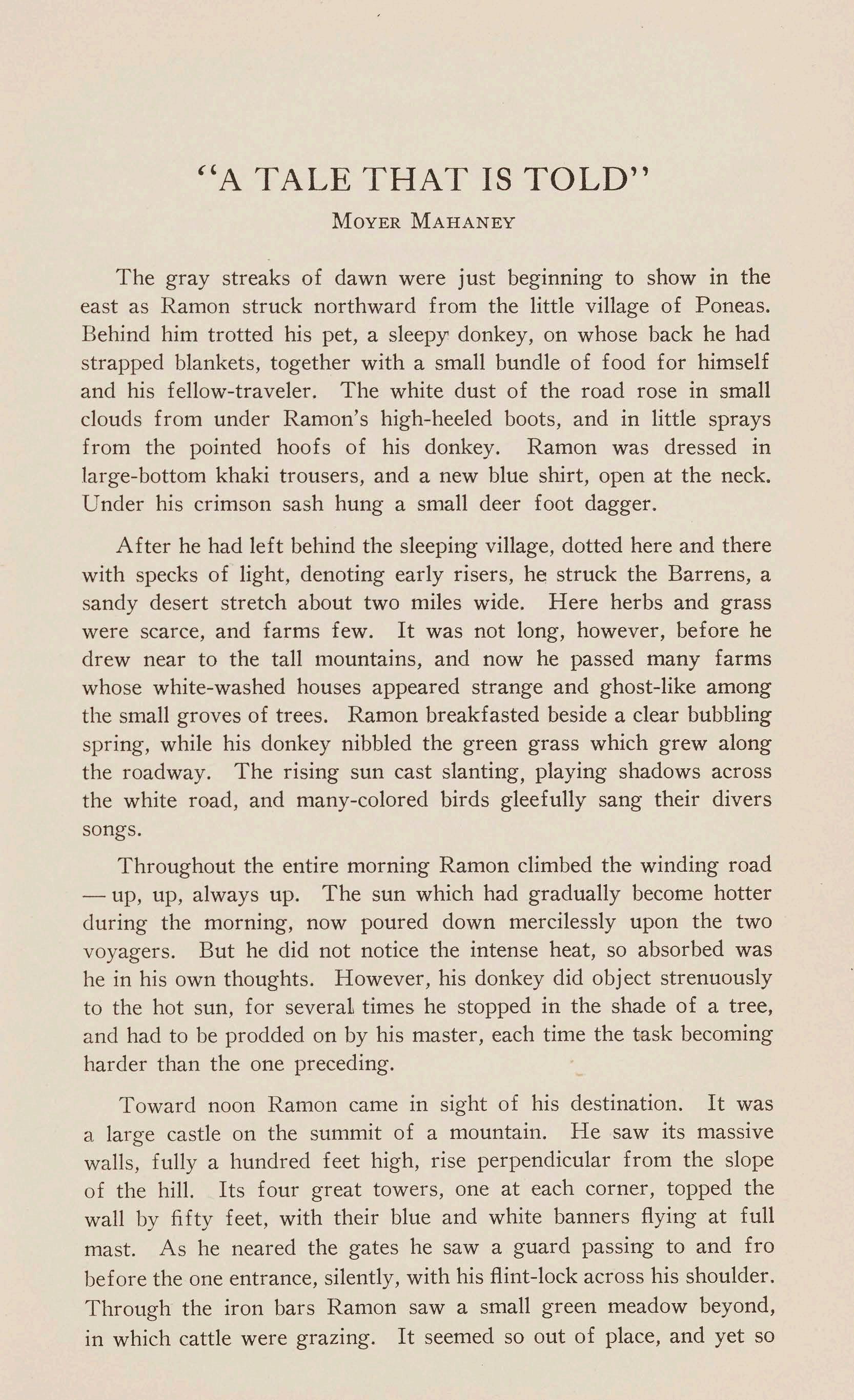
MOYER MAHANEY
The gray streaks of dawn were just beginning to show in the east as Ramon struck northward from the little village of Poneas. Behind him trotted his pet, a sleepy donkey, on whose back he had strapped blankets, together with a small bundle of food for himself and his fellow-traveler. The white dust of the road rose in small clouds from under Ramon's high-heeled boots, and in little sprays from the pointed hoofs of his donkey. Ramon was dressed in large-bottom khaki trousers, and a new blue shirt, open at the neck. Under his crimson sash hung a small deer foot dagger.
After he had left behind the sleeping village, dotted here and there with specks of light , denoting early risers, he struck the Barrens, a sandy desert stretch about two miles wide. Here herbs and grass were scarce, and farms few. It was not long, however, before he drew near to the tall mountains, and now he passed many farms whose white-washed houses appeared strange and ghost-like among the small groves of trees. Ramon breakfasted beside a clear bubbling spring, while his donkey nibbled the green grass which grew along the roadway. The rising sun cast slanting, playing shadows across the white road, and many-colored birds gleefully sang their divers songs.
Throughout the entire morning Ramon climbed the winding road -up, up, always up. The sun which had gradually become hotter during the morning, now poured down mercilessly upon the two voyagers. But he did not notice the intense heat, so absorbed was he in his own thoughts. However, his donkey did object strenuously to the hot sun, for several times he stopped in the shade of a tree, and had to be prodded on by his master, each time the task becoming harder than the one preceding.
Toward noon Ramon came in sight of his destination. It was a large castle on the summit of a mountain. He saw its massive walls, fully a hundred feet high, rise perpendicular from the slope of the hill. Its four great towers, one at each corner, topped the wall by fifty feet, with their blue and white banners flying at full mast. As he neared the gates he saw a guard passing to and fro before the one entrance, silently, with his flint-lock across his shoulder. Through the iron bars Ramon saw a small green meadow beyond, in which cattle were grazing. It seemed so out of place, and yet so
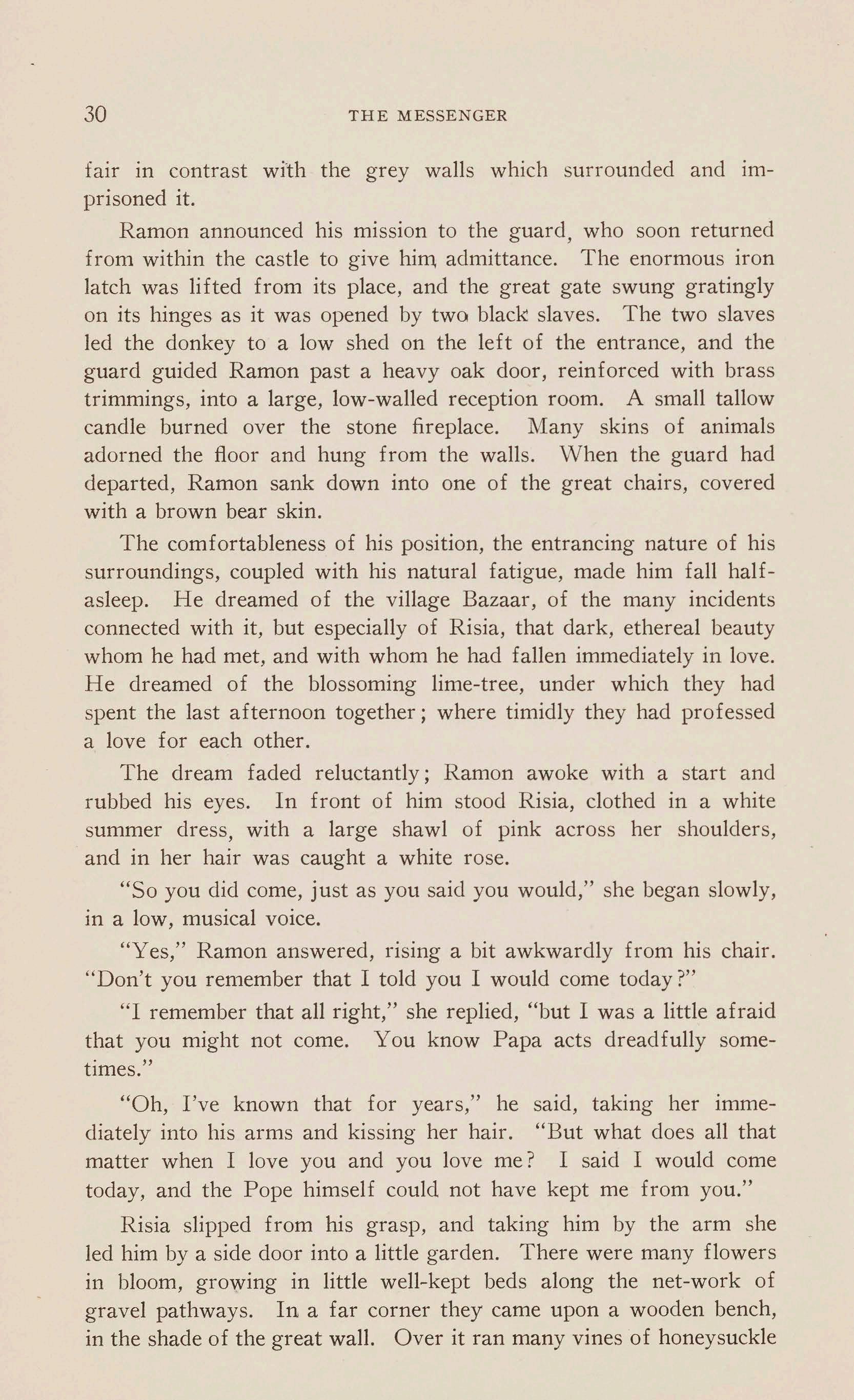
fair in contrast with the grey walls which surrounded and imprisoned it.
Ramon announced his mission to the guard, who soon returned from within the castle to give him, admittance. The enormous iron latch was lifted from its place, and the great gate swung gratingly on its hinges as it was opened by two black slaves. The two slaves led the donkey to a low shed on the left of the entrance, and the guard guided Ramon past a heavy oak door, reinforced with brass trimmings, into a large, low-walled reception room. A small tallow candle burned over the stone fireplace. Many skins of animals adorned the floor and hung from the walls. When the guard had departed, Ramon sank down into one of the great chairs, covered with a brown bear skin.
The comfortableness of his position, the entrancing nature of his surroundings, coupled with his natural fatigue, made him fall halfasleep. He dreamed of the village Bazaar, of the many incidents connected with it, but especially of Risia, that dark, ethereal beauty whom he had met, and with whom he had fallen immediately in love. He dreamed of the blossoming lime-tree, under which they had spent the last afternoon together; where timidly they had professed a love for each other.
The dream faded reluctantly; Ramon awoke with a start and rubbed his eyes. In front of him stood Risia, clothed in a white summer dress, with a large shawl of pink across her shoulders, and in her hair was caught a white rose.
"So you did come, just as you said you would," she began slowly, in a low, musical voice.
"Yes," Ramon answered, rising a bit awkwardly from his chair. "Don't you remember that I told you I would come today?"
"I remember that all right," she replied, "but I was a little afraid that you might not come. You know Papa acts dread fully sometimes."
"Oh, I've known that for years," he said, taking her immediately into his arms and kissing her hair. "But what does all that matter when I love you and you love me? I said I would come today, and the Pope himself could not have kept me from you."
Risia slipped from his grasp, and taking him by the arm she led him by a side door into a little garden. There were many flowers in bloom, growing in little well-kept beds along the net-work of gravel pathways. In a far corner they came upon a wooden bench, in the shade of the great wall. Over it ran many vines of honeysuckle
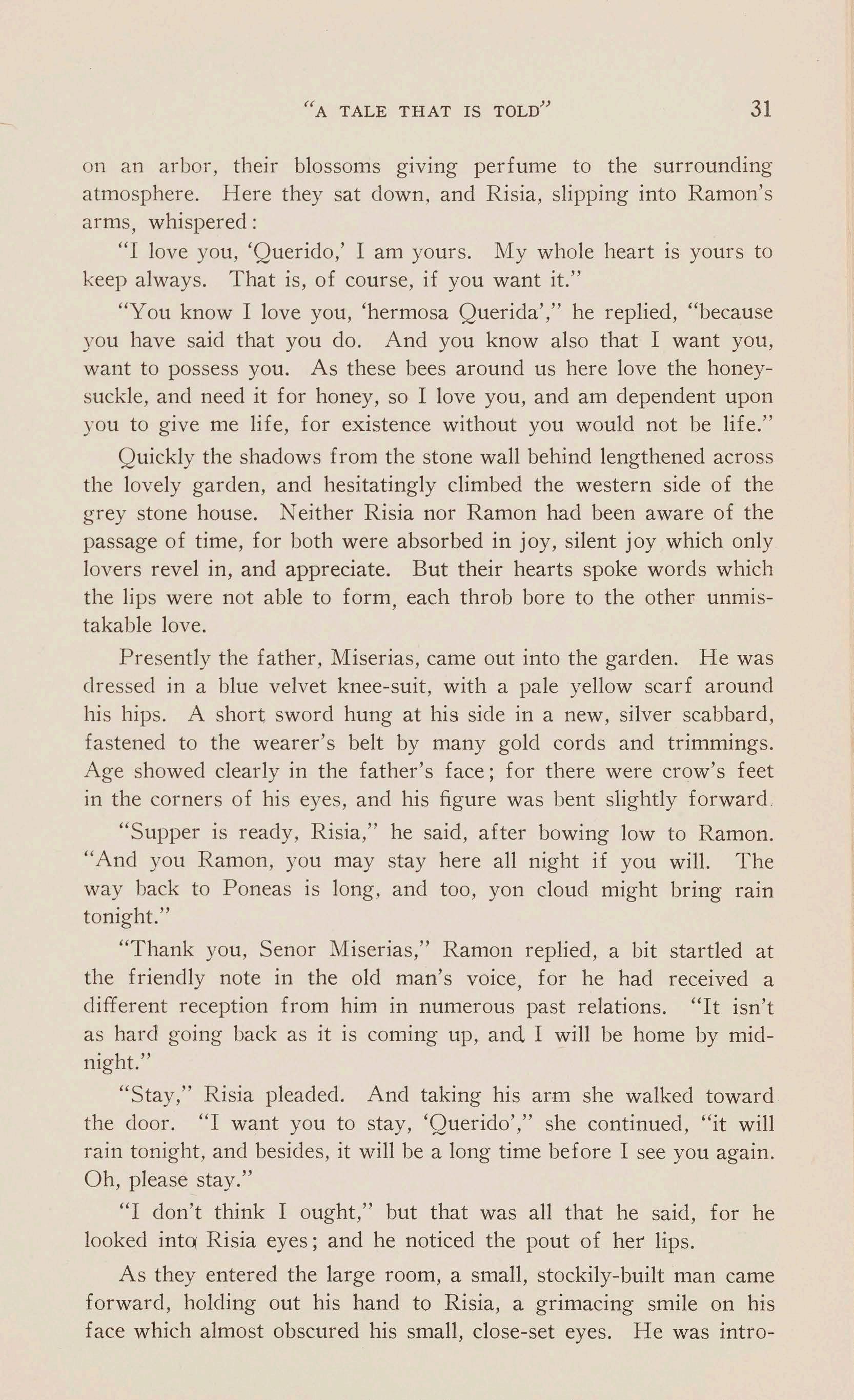
on an arbor, their blossoms giving perfume to the surrounding atmosphere. Here they sat down, and Risia, slipping into Ramon's arms, whispered:
"I love you, 'Querido,' I am yours. My whole heart is yours to keep always. That is, of course, if you want it."
"You know I love you, 'hermosa Quer ida'," he replied, "because you have said that you do. And you know also that I want you, want to possess you. As these bees around us here love the honeysuckle, and need it for honey, so I love you, and am dependent upon you to give me life, for existence without you would not be life."
Quickly the shadows from the stone wall behind lengthened across the lovely garden, and hesitatingly climbed the western side of the grey stone house. Neither Risia nor Ramon had been aware of the passage of time, for both were absorbed in joy, silent joy which only lovers revel in, and appreciate. But their hearts spoke words which the lips were not able to form, each throb bore to the other, unmistakable love.
Presently the father, Miserias, came out into the garden. He was dressed in a blue velvet knee-suit, with a pale yellow scarf around his hips. A short sword hung at his side in a new, silver scabbard, fastened to the wearer's belt by many gold cords and trimmings. Age showed clearly in the father's face; for there were crow's feet in the corners of his eyes, and his figure was bent slightly forward
"Supper is ready, Risia," he said, after bowing low to Ramon. "And you Ramon, you may stay here all night if you will. The way back to Poneas is long, and too, yon cloud might bring rain tonight ."
"Thank you, Senor Miserias," Ramon replied, a bit startled at the friendly note in the old man's voice, for he had received a different reception from him in numerous past relations. "It isn't as hard going back as it is coming up, and I will be home by midnight."
"Stay ," Risia pleaded. And taking his arm she walked toward the door. "I want you to stay, 'Querido'," she continued, "it will rain tonight, and besides, it will be a long time before I see you again. Oh, please stay."
"I don't think I ought," but that was all that he said, for he looked into, Risia eyes; and he noticed the pout of her lips.
As they entered the large room, a small, stockily-built man came forward, holding out his hand to Risia, a grimacing smile on his face which almost obscured his small, close - set eyes. He was intro-
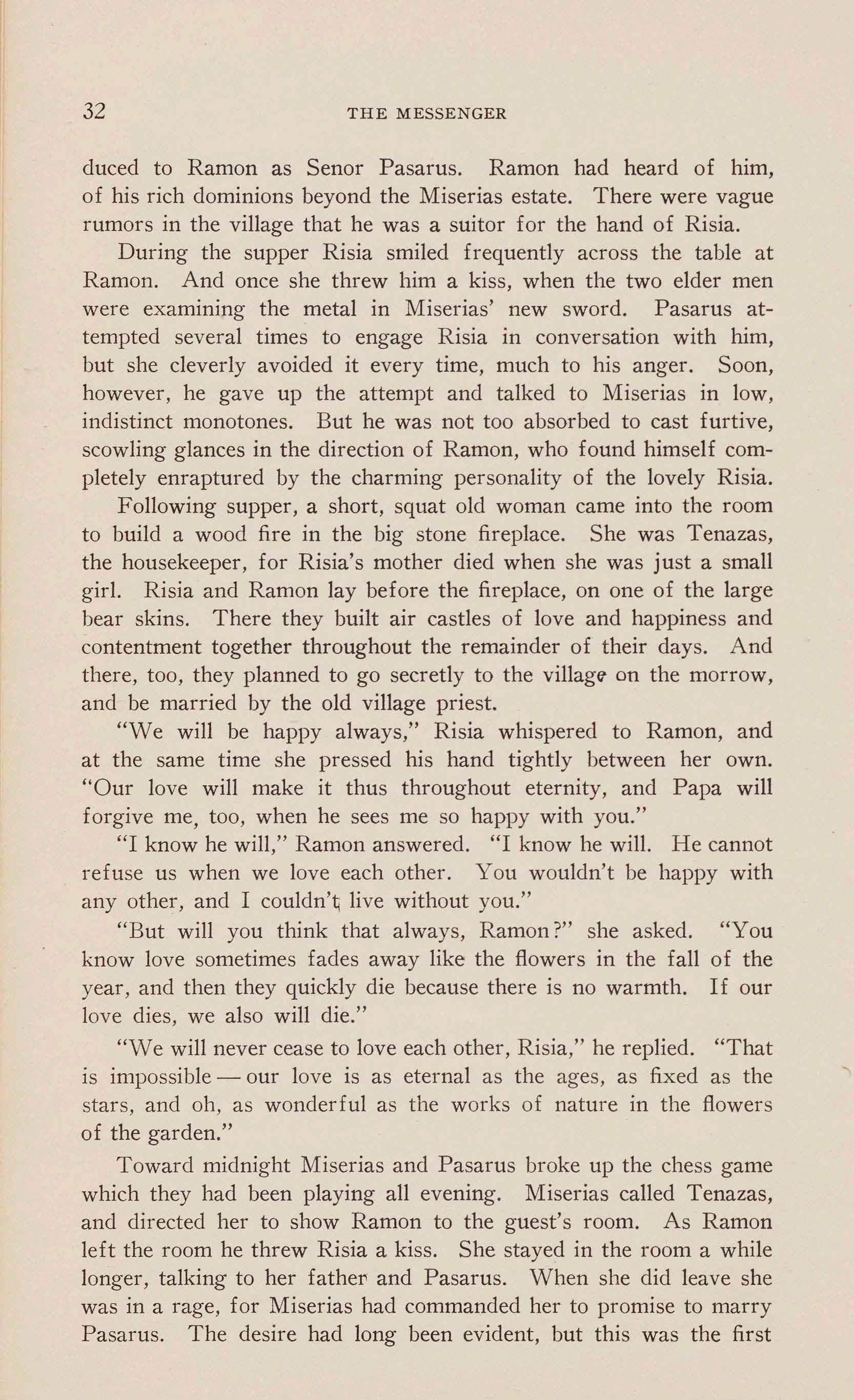
duced to Ramon as Senor Pasarus. Ramon had heard of him, of his rich dominions beyond the Miserias estate. There were vague rumors in the village that he was a suitor for the hand of Risia.
During the supper Risia smiled frequently across the table at Ramon. And once she threw him a kiss, when the two elder men were examining the metal in Miserias' new sword. Pasarus attempted several times to engage Risia in conversation with him, but she cleverly avoided it every time, much to his anger. Soon, however, he gave up the attempt and talked to Miserias in low, indistinct monotones. But he was not too absorbed to cast furtive, scowling glances in the direction of Ramon, who found himself completely enraptured by the charming personality of the lovely Risia.
Following supper, a short, squat old woman came into the room to build a wood fire in the big stone fireplace. She was Tenazas, the housekeeper, for Risia's mother died when she was just a small girl. Risia and Ramon lay before the fireplace, on one of the large bear skins. There they built air castles of love and happiness and contentment together throughout the remainder of their days. And there, too, they planned to go secretly to the villag(i' on the morrow, and be married by the old village priest.
"We will be happy always," Risia whispered to Ramon, and at the same time she pressed his hand tightly between her own. "Our love will make it thus throughout eternity, and Papa will forgive me, too, when he sees me so happy with you."
"I know he will," Ramon answered. "I know he will. He cannot refuse us when we love each other. You wouldn't be happy with any other, and I couldn'~ live without you."
"But will you think that always, Ramon?" she asked. "You know love sometimes fades away like the flowers in the fall of the year, and then they quickly die because there is no warmth. If our love dies, we also will die."
"We will never cease to love each other, Risia," he replied. "That is impossible -our love is as eternal as the ages, as fixed as the stars, and oh, as wonderful as the works of nature in the flowers of the garden."
Toward midnight Miserias and Pasarus broke up the chess game which they had been playing all evening. Miserias called Tenazas, and directed her to show Ramon to the guest's room. As Ramon left the room he threw Risia a kiss. She stayed in the room a while longer, talking to her fathel' and Pasarus. When she did leave she was in a rage, for Miserias had commanded her to promise to marry Pasarus. The desire had long been evident, but this was the first
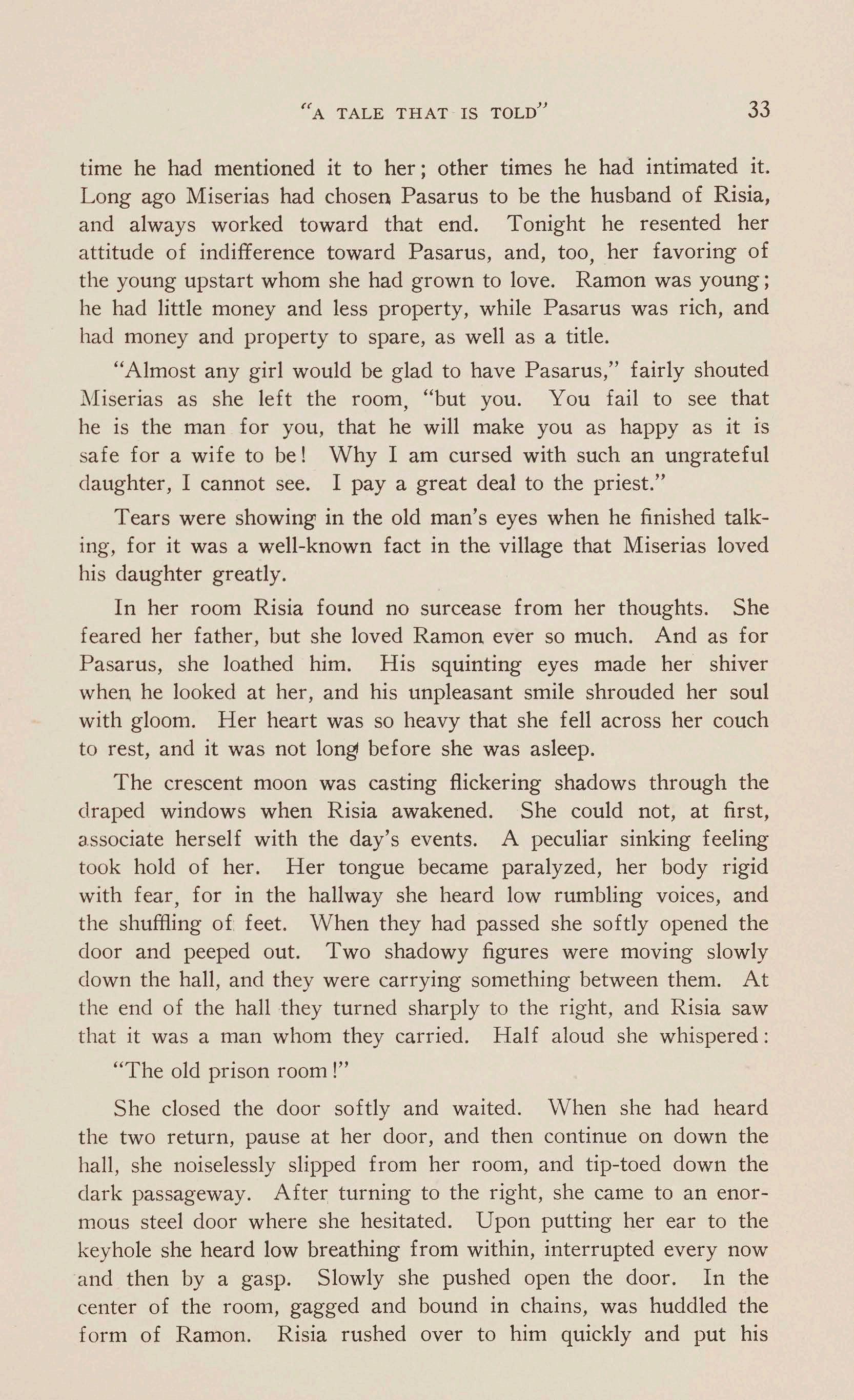
time he had mentioned it to her ; other times he had intimated it. Long ago Miserias had chosen Pasarus to be the husband of Risia, and always worked toward that end. Tonight he resented her attitude of indifference toward Pasarus, and, too, her favoring of the young upstart whom she had grown to love. Ramon was young; he had little money and less property, while Pasarus was rich, and had money and property to spare, as well as a title.
"Almost any girl would be glad to have Pasarus," fairly shouted Miserias as she left the room, "but you. You fail to see that he is the man for you, that he will make you as happy as it is safe for a wife to be! Why I am cursed with such an ungrateful daughter, I cannot see. I pay a great deal to the priest."
Tears were showing in the old man's eyes when he finished talking, for it was a well-known fact in the village that Miserias loved his daughter greatly.
In her room Risia found no surcease from her thoughts. She feared her father, but she loved Ramon ever so much. And as for Pasarus, she loathed him. His squinting eyes made her shiver when he looked at her , and his unpleasant smile shrouded her soul with gloom. Her heart was so heavy that she fell across her couch to rest, and it was not longf before she was asleep.
The crescent moon was casting flickering shadows through the draped windows when Risia awakened. She could not, at first, associate herself with the day's events. A peculiar sinking feeling took hold of her. Her tongue became paralyzed, her body rigid with fear, for in the hallway she heard low rumbling voices, and the shuffling of. feet. When they had passed she softly opened the door and peeped out. Two shadowy figures were moving slowly clown the hall, and they were carrying something between them. At the end of the hall they turned sharply to the right, and Risia saw that it was a man whom they carried. Half aloud she whispered:
"The old prison room !"
She closed the door softly and waited. When she had heard the two return, pause at her door, and then continue on down the hall, she noiselessly slipped from her room, and tip-toed down the dark passageway. After turning to the right, she came to an enormous steel door where she hesitated. Upon putting her ear to the keyhole she heard low breathing from within, interrupted every now and then by a gasp. Slowly she pushed open the door. In the center of the room, gagged and bound in chains, was huddled the form of Ramon. Risia rushed over to him quickly and put his

head in her lap. \i\lith her handkerchief she began w1pmg away the blood which flowed from a gash in his forehead, and at the same time asking excitedly:
"Querido, are you hurt, are you dead, can you hear me, what's happened to ?" but her questions were interrupted. Suddenly the floor beneath them gave away. She had time to utter only a half-cry. There was a crash, then silence.
When morning came Miserias and Pasarus arose from their bed of skins before the fire. They took several drinks apiece from the bottles sitting near them on the floor, and then they decided to go and take a look into the pit, before calling Risia.
The spectacle which met their eyes was different from the one which they had expected. It is rumored that Miserias slew Pasarus on the spot. At any rate he was never heard of from that day.
Much have I given of myself to youLove, and a faith that walks securely blind Through all the clear, dark hallways of your mind, Unquestioning the things you say or do.
I have not touched with any careless hand
The shrines you keep, for there are rooms, I know, Where tenderness alone can never go , Being a woman. Could she understand?
And yet this hunger will not always wait! Some day I shall hold close my candle's flame
Revealingly, and some day I shall claim A little key you hold inviolate.
CUTHBERT WHOOSIS
Are you a, 100% Spider. Would you like to find out just how well you mea sure up to the fine standard of true Spiderism? Of course , you would ! And how very simple it is, too. .First, you take a piece of paper and a pencil ( though a pen will do very nicely) and then you ask yourself the questions listed below. Every time you can lay your hand on the latest copy of The Web, and truthfully swear to an affirmative answer, place the number accompanying the question upon the piece of paper. Having examined the innermost recesses of your soul in the light of these queries, add up the figures now found upon the piece of paper. The resultant sum indicates the intensity of your Spider Spirit in terms of percentage.
1. If your trousers measure twenty inches around the bottoms ·-

Add 2
2. For every inch over twenty ........... ................................. Add 5
3 . If y ou frequently boast , "And I never cracked a book during the whole term" . Add 3
4. If you consider Th e Plastic Ag e "hot stuff", and a true portrait of college life Add 5
5. If you take your full allowance of class cuts each term ----······
6. If y our v ocabulary include s the verb "to neck" ....... ..... Add 6
7. If yo u think compul sory Chapel attendance is a lot o f apple
5
8 . If , in your estimation , the food served at the cafeteria is atrocious and the prices outrageous ............... .... Add 7
9. If y ou ref er to the executive head of this institution a s "Boaty''
10. If you scale the Tower Hill right after dinner to fill a ten minute, Seven P. M., date with some fair co-ordinate ··
Adel 10
· Add 13
11. If you never present a term paper on scheduled time.. Adel 5
12. If , at ten minute s after hour , the Prof not having arrived , you stand up and shout, "Let's go!"........ Add 5
13. If , when the Prof holds the class several seconds overtime, you scrape your number fourteen Walkovers noisily upon the floor ............
Add 8
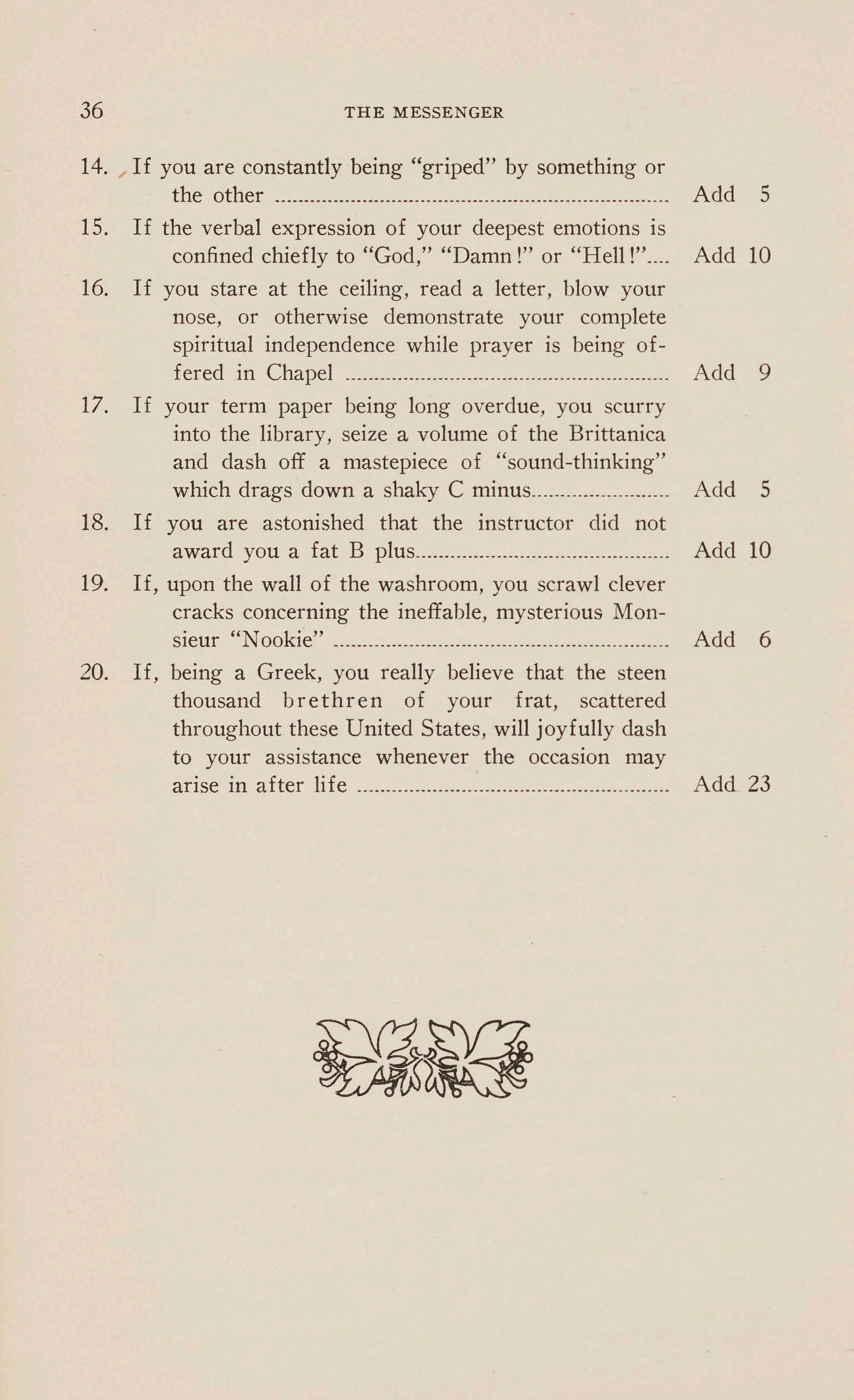
14. If you are constantly being "griped" by something or the other ............... ...................... ....... ......... ............... Add 5
15. If the verbal expression of your deepest emotions is confined chiefly to "God," "Damn!" or "Hell!" .... Add 10
16. If you stare at the ceiling, read a letter, blow your nose , or otherwise demonstrate your complete spiritual independence while prayer is bein g offered in Chapel .......... ....... ..................... .................. A dd 9
17. If your term paper being long overdue, you scurry into the library , seize a volume of the Brittanica and dash off a mastepiece o f "sound-thinking " which drags down a shaky C minus ...... ...... ............ Add 5
18. If you are astonished that the in struct or did not award you a fat B plus ......... ................... ................ Add 10
19. If, upon the wall of the washroom, you scrawl clever cracks concerning the ineffable , mysterious Monsieur "N ookie" ...................
.. Add 6
20. If, being a Greek, you really believe that the steen thousand brethren of your frat , scattered throughout these United States, will joyfully dash to your assistance whenever the occasion may arise in after life ...........
.................................. Add 23

MARGARET HARLAN
In the land that lies to the south which is bounded on the north by the river Gerde, and is held in the hollow of the Seven White Capped Hill s, lived a splendid and courageous king, Hagan, in a big stone palace, which had gilded pillars and stone lions on the front lawn , and a pond in which were gold fishes of all sorts, and around which was an iron railing to keep people from falling in. The palace was very white. The roof was quite gabled and spired, and leaked somewhat in; rainy weather, but it was a grand palace nevertheless, for it had belonged to King Hagan's great-grand-king-father, so that no one suspected ' a royal carpenter building a roof which might one day be within reproach. So when it rained, the three beautiful daughters of the King set the two big dragon vases which the greatgrand-king-father had brought from China, under the leaky spots, and washed their best underthings and fine handkerchiefs in the water that dripped into the vases, because they said that rain water made nice things so much softer and whiter,
Now, when King Hagan was a very young man he had taken a long journey and had had many remarkable adventures which caused him to be known ever afterwards as courageous and splendid. Because it was the only very long journey he had taken in the whole of his life, he never tired telling of it after dinner was over and full stomachs made activity seem all the more wonderful. As no one ever thought of suggesting to the King that all his subjects knew his adventures quite by heart, the story passed and repassed until the three daughters, who had always been to dinner even when they were very small, could recite the whole of it.
Perhaps because she was the eldest and heard the tale more often than the others and was just a: bit tired of it, Jonquil said very little and only smiled, "Yes" and "No," and "I think so, too." And maybe Hyacinth, who was the youngest, had not heard enough of story telling to be very practical, for she, too, talked very little and only smiled, "Yes" and "No," and "I think so, too." But Forsythia, the middle daughter, probably because she was old enough to have become adept and because she was not yet too old to have heard so much story telling, talked with both profusion and celerity. That is, when the King wasn't around. She was very proud of her father's adventures and fond of telling them to the wives of all the new ambassadors and any of her father's subjects who chanced to be
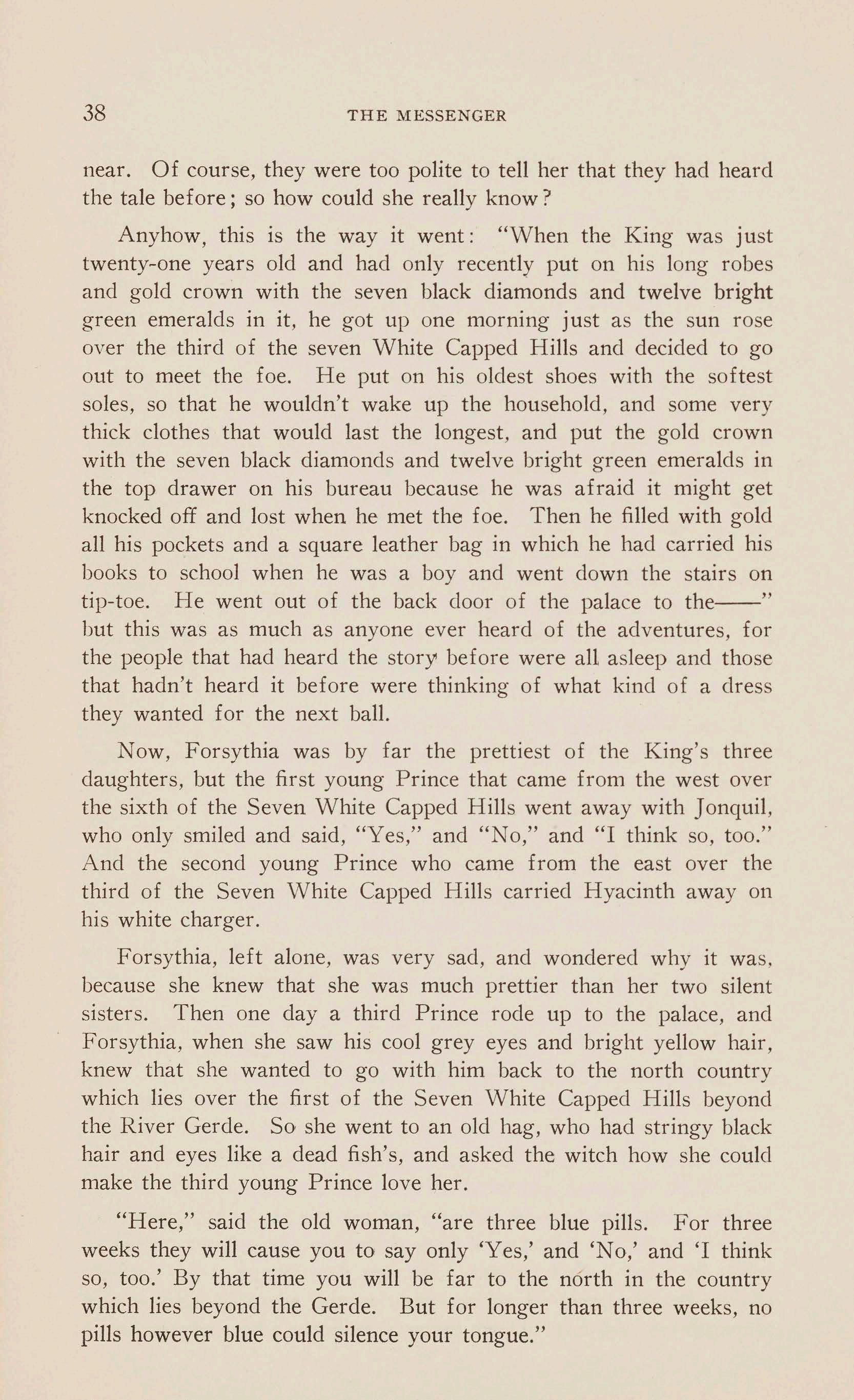
near. Of course, they were too polite to tell her that they had heard the tale before ; so how could she really know?
Anyhow, this is the way it went: "When the King was just twenty - one years old and had only recently put on his long robes and gold crown with the seven black diamonds and twelve bright green emeralds in it, he got up one morning just as the sun rose over the third of the seven White Capped Hills and decided to go out to meet the foe. He put on his oldest shoes with the softest soles, so that he wouldn't wake up the household, and some very thick clothes that would last the longest, and put the gold crown with the seven black diamonds and twelve bright green emeralds in the top drawer on his bureau because he was afraid it might get knocked off and lost when he met the foe. Then he filled with gold all his pockets and a square leather bag in which he had carried his books to school when he was a boy and went down the stairs on tip-toe. He went out of the back door of the palace to the--" but this was as much as anyone ever heard of the adventures, for the people that had heard the story before were all asleep and those that hadn't heard it before were thinking of what kind of a dress they wanted for the next ball.
Now, Forsythia was by far the prettiest of the King's three daughters, but the first young Prince that came from the west over the sixth of the Seven White Capped Hills went away with Jonquil, who only smiled and said, "Yes," and "No," and "I think so, too." And the second young Prince who came from the east over the third of the Seven White Capped Hills carried Hyacinth away on his white charger.
Forsythia, left alone, was very sad, and wondered why it was , because she knew that she was much prettier than her two silent sisters. Then one day a third Prince rode up to the palace, and Forsythia, when she saw his cool grey eyes and bright yellow hair, knew that she wanted to go with him back to the north country which lies over the first of the Seven White Capped Hills beyond the River Gerde. So she went to an old hag, who had stringy black hair and eyes like a dead fish's, and asked the witch how she could make the third young Prince love her.
"Here," said the old woman, "are three blue pills. For three weeks they will cause you to say only 'Yes,' and 'No,' and 'I think so, too.' By that time you will be far to the north in the country which lies beyond the Gerde. But for longer than three weeks, no pills however blue could silence your tongue."
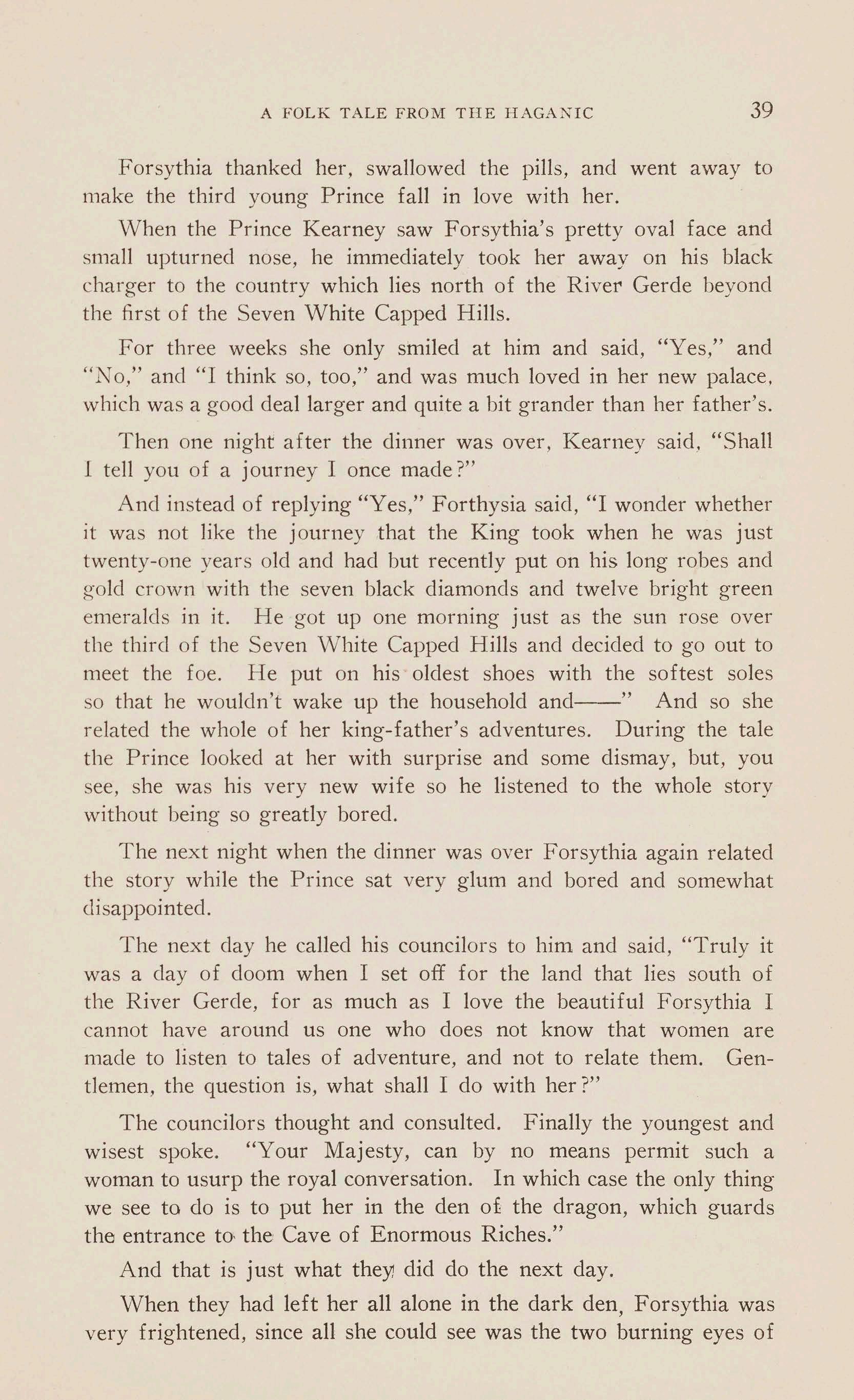
Forsythia thanked her, swallowed the pills, and went away to make the third young Prince fall in love with her.
When the Prince Kearney saw Forsythia's pretty oval face and small upturned nose, he immediately took her away on his black charger to the country which lies north of the River Gercle beyond the first of the Seven White Capped Hills.
For three weeks she only smiled at him and said, "Yes," and "No," and "I think so, too," and was much loved in her new palace, which was a good deal larger and quite a bit grander than her father's.
Then one night after the dinner was over, Kearney said, "Shall I tell you of a journey I once made?"
And instead of replying "Yes," Forthysia said, "I wonder whether it was not like the journey that the King took when he was just twenty-one years old and had but recently put on his long robes and gold crown with the seven black diamonds and twelve bright green emeralds in it. He got up one morning just as the sun rose over the third of the Seven White Capped Hills and clecicleclto go out to meet the foe. He put on his oldest shoes with the so£test soles so that he wouldn't wake up the household and--" And so she related the whole of her king-father's adventures. During the tale the Prince looked at her with surprise and some dismay, but, you see, she was his very new wife so he listened to the whole story without being so greatly bored.
The next night when the dinner was over Forsythia again related the story while the Prince sat very glum and bored and somewhat disappointed.
The next clay he called his councilors to him and said, "Truly it was a clay of doom when I set off for the land that lies south of the River Gerde, for as much as I love the beautiful Forsythia I cannot have around us one who does not know that women are made to listen to tales of adventure, and not to relate them. Gentlemen, the question is, what shall I do with her?"
The councilors thought and consulted. Finally the youngest and wisest spoke. "Your Majesty, can by no means permit such a woman to usurp the royal conversation. In which case the only thing we see to do is to put her in the den of the dragon, which guards the entrance to, the Cave of Enormous Riches."
And that is just what they, did do the next day.
When they had left her all alone in the dark den, Forsythia was very frightened, since all she could see was the two burning eyes of
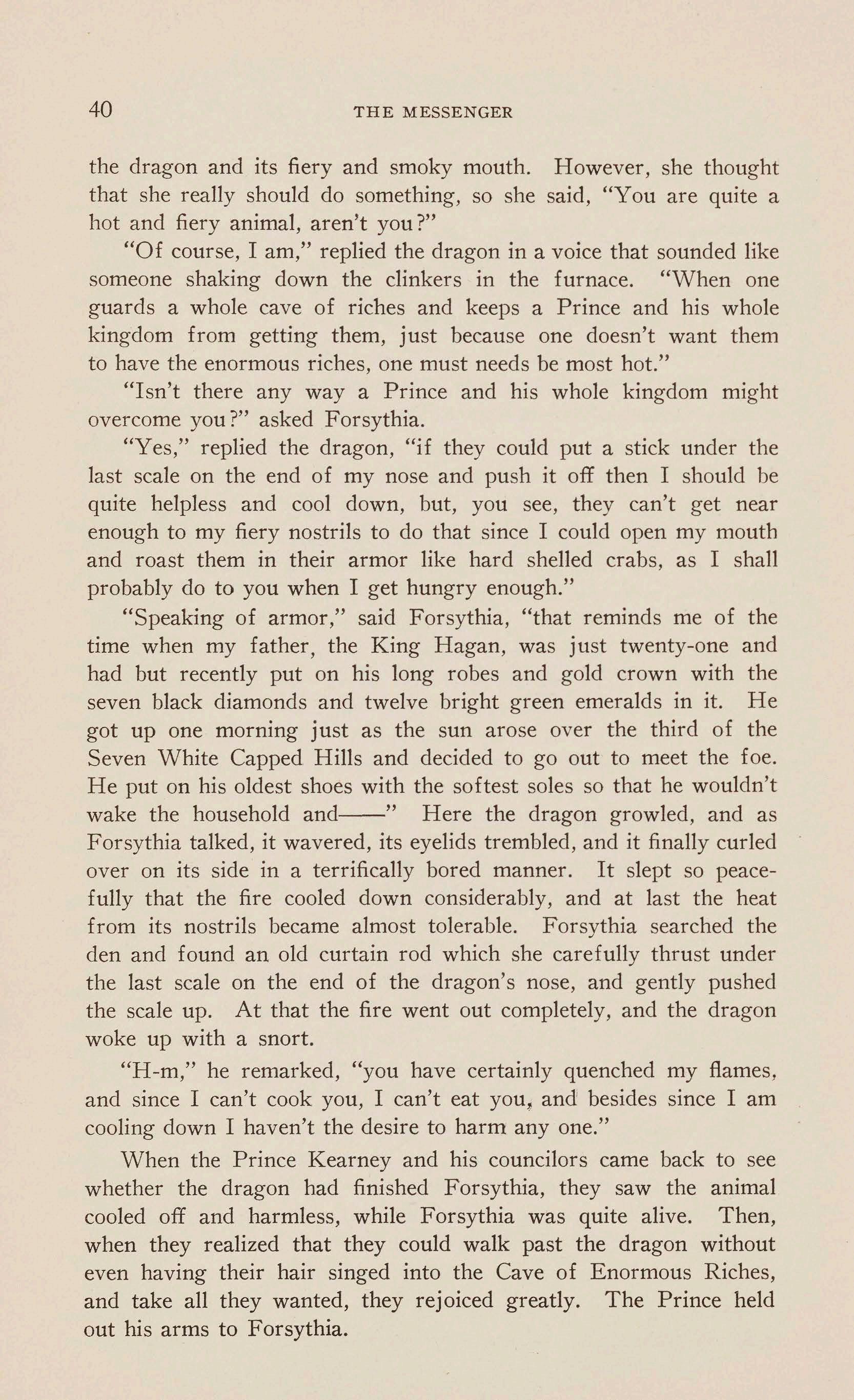
the dragon and its fiery and smoky mouth. However, she thought that she really should do something, so she said, "You are quite a hot and fiery animal, aren't you?"
"Of course, I am," replied the dragon in a voice that sounded like someone shaking down the clinkers in the furnace. "When one guards a whole cave of riches and keeps a Prince and his whole kingdom from getting them, just because one doesn't want them to have the enormous riches, one must needs be most hot."
"Isn't there any way a Prince and his whole kingdom might overcome you?" asked Forsythia.
"Yes," replied the dragon, "if they could put a stick under the last scale on the end of my nose and push it off then I should be quite helpless and cool down , but, you see, they can't get near enough to my fiery nostrils to do that since I could open my mouth and roast them in their armor like hard shelled crabs, as I shall probably do to you when I get hungry enough "
"Speaking of armor," said Forsythia, "that reminds me of the time when my father, the King Hagan, was just twenty-one and had but recently put on his long robes and gold crown with the seven black diamonds and twelve bright green emeralds in it. He got up one morning just as the sun arose over the third of the Seven White Capped Hills and decided to go out to meet the foe. He put on his oldest shoes with the softest soles so that he wouldn't wake the household and--" Here the dragon growled, and as Forsythia talked, it wavered, its eyelids trembled, and it finally curled over on its side in a terrifically bored manner. It slept so peacefully that the fire cooled down considerably , and at last the heat from its nostrils became almost tolerable . Forsythia searched the den and found an old curtain rod which she carefully thrust under the last scale on the end of the dragon's nose, and gently pushed the scale up. At that the fire went out completely, and the dragon woke up with a snort.
"H-m," he remarked, "you have certainly quenched my flames , and since I can't cook you, I can't eat you~ and besides since I am cooling clown I haven't the desire to harm any one."
When the Prince Kearney and his councilors came back to see whether the dragon had finished Forsythia, they saw the animal cooled off and harmless, while Forsythia was quite alive. Then, when they realized that they could walk past the dragon without even having their hair singed into the Cave of Enormous Riches, and take all they wanted, they rejoiced greatly. The Prince held out his arms to Forsythia.
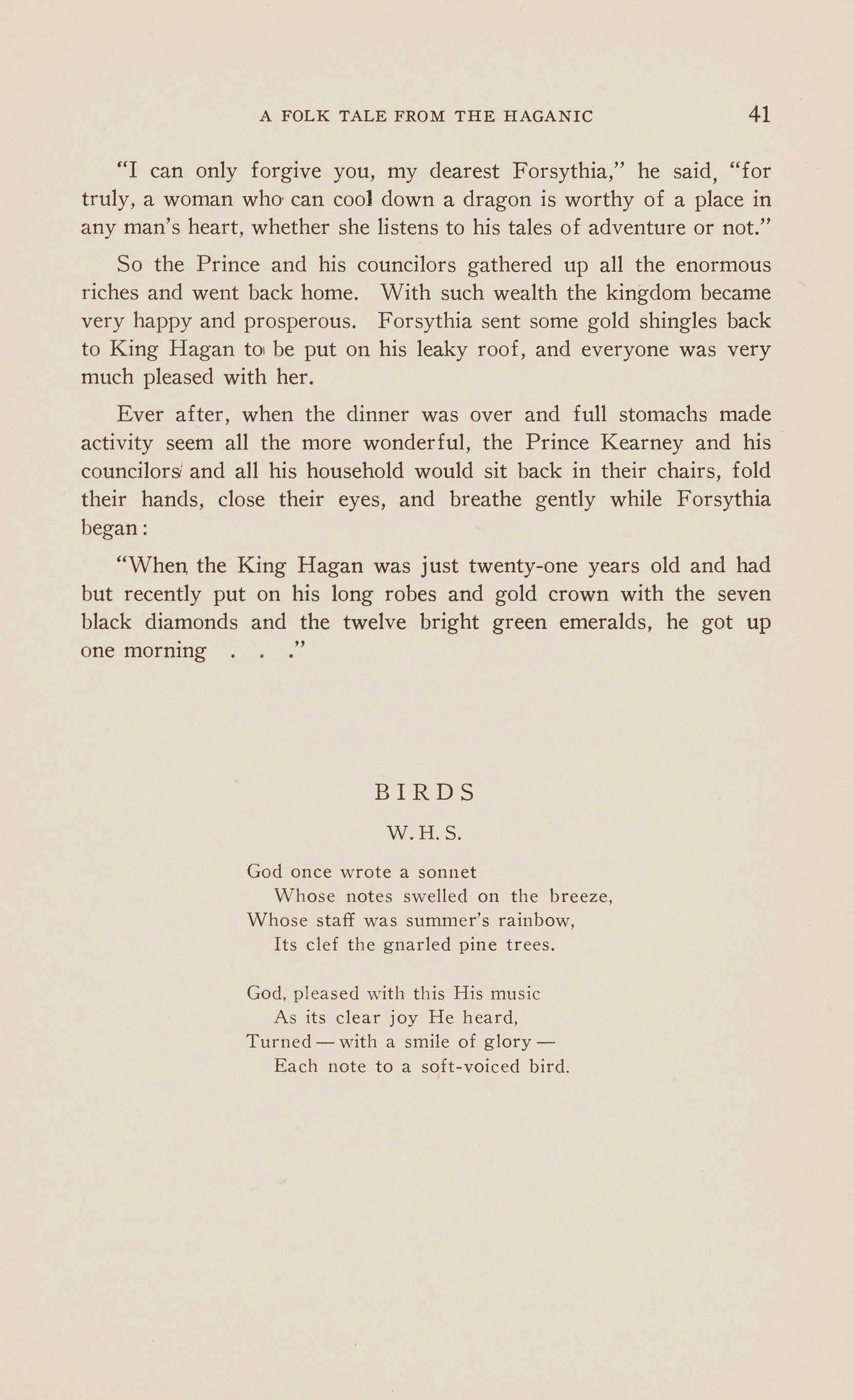
"I can only forgive you, my dearest Forsythia," he said, "for truly, a woman who· can cool down a dragon is worthy of a place in any man's heart, whether she listens to his tales of adventure or not."
So the Prince and his councilors gathered up all the enormous riches and went back home. With such wealth the kingdom became very happy and prosperous. Forsythia sent some gold shingles back to King Hagan t01be put on his leaky roof, and everyone was very much pleased with her.
Ever after, when the dinner was over and full stomachs made activity seem all the more wonderful, the Prince Kearney and his councilors and all his household would sit back in their chairs, fold their hands, close their eyes, and breathe gently while Forsythia began:
"When the King Hagan was just twenty-one years old and had but recently put on his long robes and gold crown with the seven black diamonds and the twelve bright green emeralds, he got up one morning "
W.H.S.
God once wrote a sonnet
Whose note s swelled on the breeze , Whose staff was summer's rainbow , Its clef the gnarled pine trees.
Goel. pl eased w ith this His musi c A s its clear joy He heard , Turn e d -with a smile of gloryEach note to a soft-voiced bird.
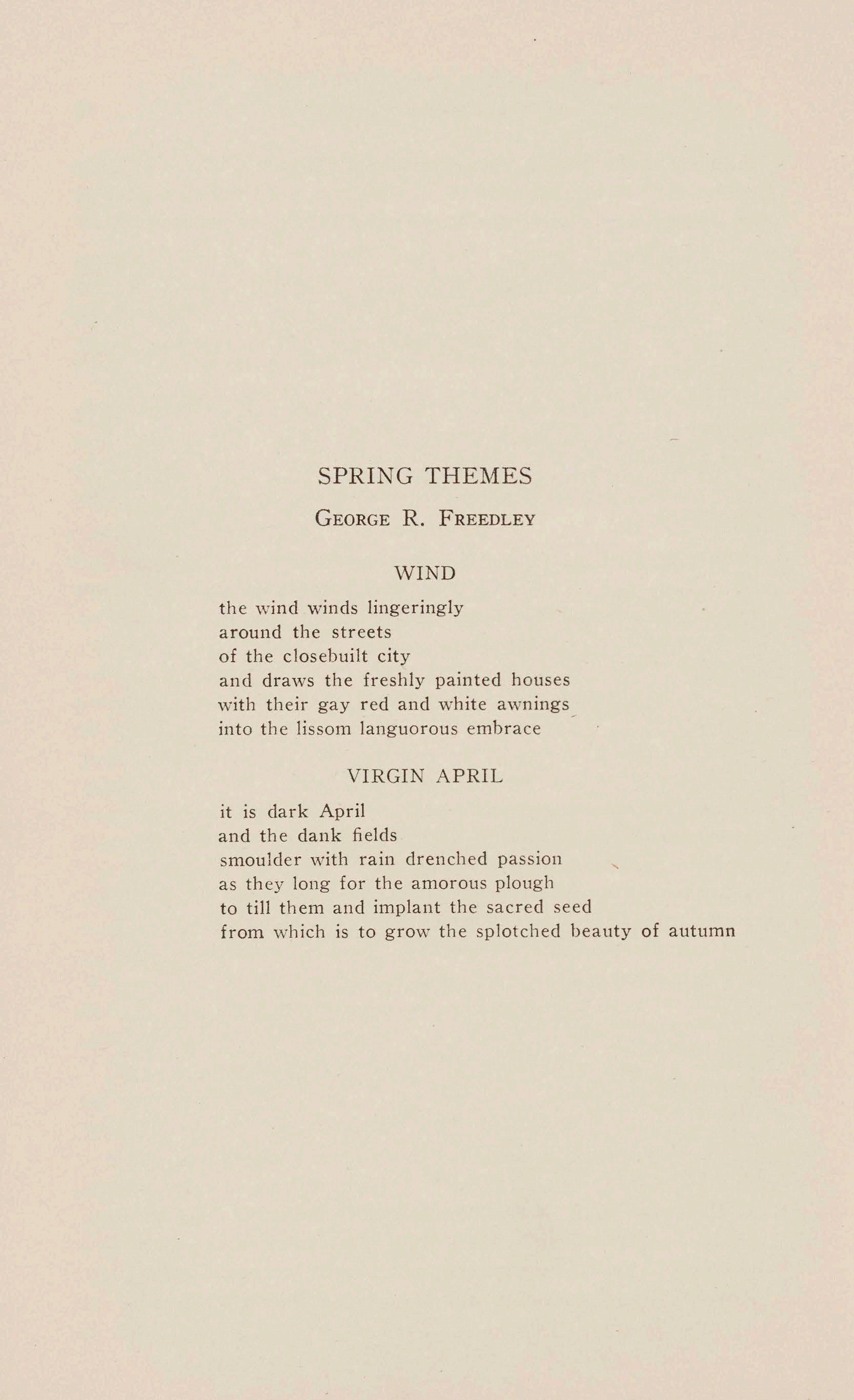
GEORGE R. FREEDLEY
the wind winds lingeringly around the streets of the closebuilt c ity and draws the freshly painted houses with their gay red and white awnings into the lissom languorou s em brace
1t 1s dark April and the dank fields smoulder with rain drenched passion as they long for the amorous plough to till them and implant the sacred seed from which is to grow the splotched beauty of autumn

GARLAND RICHARDSON
"A trifle more powder over the left ear, Jean. There, that will do." Sir Frederick Lovelace stretched his shapely legs out before him and glanced at his watch. Three o'clock. And his appointment with Mary Littleton was for four. A half hour would take him there.
The fresh odor of hyacinths floated through the window and Sir Frederick smiled reminiscently, recalling his parting from Mary. Five years ago ! He was now twenty-six, and within the past five years -what a callow youth he must have been then. But he had also been a hopeful and very ambitious one. He had been filled with the desire to emulate his relative, Richard, in the fields of poetryay, and surpass him, too. And Mary had begged him so prettily to remain with her and not to run off to the great town, where he would probably starve. And he had sworn by great oaths that, successful or starving, he would ever remain her true knight. Well, he had not starved, but that was due only to the fortunate death of an uncle, who had been so indiscreet as to try to ·stop the point of a rapier with his right lung, but who had not met with any notable success.
Her true knight! Sir Frederick's face softened; for a moment there was almost a gleam of pity in his fine eyes for that boy who had been so sure of himself. Still, that was what men were always saying to women. It was a shame that they could not sometimes speak truth. He shook his head abruptly, as though to clear a mist from before his eyes. Egad, he was almost getting sentimental, and he had not yet drunk enough wine today for that.
Would Mary be much changed? She had once been very lovely, with her violet eyes under shavings of gold. Unless she had had the small-pox she probably had many lovers now. Still, he was not certain. Mary had a queer religious streak in her, somewhat similar to that which possessed these accursed Roundheads. And her father had encouraged her.
Damn the Roundheads! This trouble was coming up at such a confoundedly awkward time. He was to join the King's army tomorrow, either to sweep the scum out of, or else to bury it in, merry England. But that was tomorrow. This afternoon he was going to see Mary Littleton.

As he entered her home, he was struck by the hard severity of its furnishings. Not a picture to be seen, and . Sir Frederick laughed quietly. By Jupiter, there was a Bible! How Mary must have changed ! Small-pox sometimes did that to ladies who had once been beautiful, he thought cynically. Oh well, he would be kind to her. It really: did not much matter now, since the Lady Lucille de Montfort had accepted him, and since, by an odd coincidence, he happened to be in love with his fiancee.
A light footstep sounded behind him. He whirled around, prepared to see anything and stood astounded. She was clad in plain black satin, but, Jove, what beauty that satin contained.
"How are you, Sir Frederick?" Mary's voice was gently modulated, but it seemed to him tha~ it had lost much of its warmth and tender feeling. Five years! He would change all that.
"By the splendour of Venus, Mary, thou art more beautiful than ever !"
A shadow crossed her face, changing the violet eyes almost to purple. "The children of the Lord do not swear by heathen trollops, and they do not enjoy hearing others do so."
"I crave thy pardon, Mary, but I was astounded and knew not what I spoke."
"Will you sit down, Sir Frederick?" Mary's voice was coolly courteous.
"Mary!" Sir Frederick carefully introduced a note of pleading into his tone. "I can recall a time when thou wert not so formal with me. Why dost' thou say 'Sir Frederick' and 'you'? Am I no longer to be numbered among thy friends?"
Mary tapped the table beside her nervously, but her voice remained unchanged as she explained : "You forget that these past few years have thrown up a wall between us. My father is even now with the army of the Lord , while you -you come to me dressed in lace and gold. And though I once called you 'thou,' it was but a game and one of your foolish plays." But even as she spoke thus, there was a look of unwilling admiration in her eyes that did not escape the Cavalier sitting opposite her.
But, apparently not seeing it, Sir Frederick looked at her bewilderedly. "It was to you but play and a game? My God, I would have staked my life upon that game." Inwardly he wondered whether his acting had not been a little too pronounced.
But no suspicion appeared upon Mary's face. "Which no doubt explains why you wrote so often!" was all she replied.
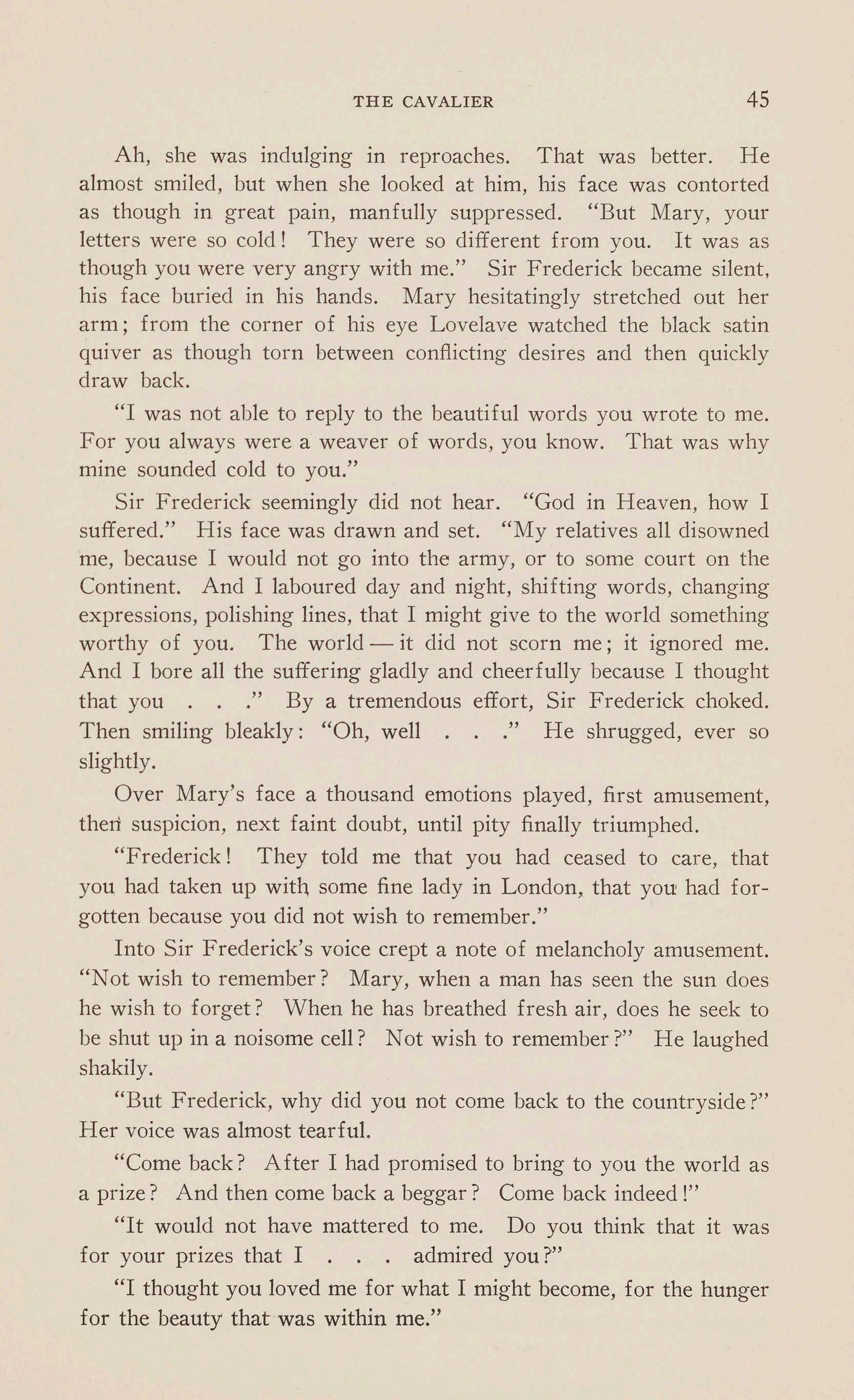
Ah, she was indulging in reproaches. That was better. He almost smiled, but when she looked at him, his face was contorted as though in great pain, manfully suppressed. "But Mary, your letters were so cold! They were so different from you. It was as though you were very angry with me." Sir Frederick became silent, his face buried in his hands. Mary hesitatingly stretched out her arm; from the corner of his eye Lovelave watched the black satin quiver as though torn between conflicting desires and then quickly draw back.
"I was not able to reply to the beautiful words you wrote to me. For you always were a weaver of words, you know. That was why mine sounded cold to you."
Sir Frederick seemingly did not hear. "God in Heaven, how I suffered." His face was drawn and set. "My relatives all disowned me, because I would not go into the army, or to some court on the Continent. And I laboured day and night, shifting words, changing expressions, polishing lines, that I might give to the world something worthy of you. The world - it did not scorn me; it ignored me. And I bore all the suffering gladly and cheerfully because I thought that you " By a tremendous effort, Sir Frederick choked. Then smiling bleakly: "Oh, well " He shrugged, ever so slightly.
Over Mary's face a thousand emotions played, first amusement, theri suspicion, next faint doubt, until pity finally triumphed.
"Frederick! They told me that you had ceased to care, that you had taken up with some fine lady in London, that you had forgotten because you did not wish to remember."
Into Sir Frederick's voice crept a note of melancholy amusement. "Not wish to remember? Mary, when a man has seen the sun does he wish to forget? When he has breathed fresh air, does he seek to be shut up in a noisome cell? Not wish to remember?" He laughed shakily.
"But Frederick, why did you not come back to the countryside?" Her voice was almost tearful.
"Come back? After I had promised to bring to you the world as a prize? And then come back a beggar ? Come back indeed !"
"It would not have mattered to me. Do you think that it was for your prizes that I admired you?"
"I thought you loved me for what I might become, for the hunger for the beauty that was within me."

"Oh, how little you know of women! For your hunger for beauty? That may have been, for that hunger was part of you. But for what you might become? Frederick, a woman loves a man for himself."
"But what was I? Nothing."
"You were a boy with noble thoughts, and some that were very beautiful. And for those thoughts I loved you. But now-how lon_ghas it been since you wrote a poem?"
"I have not set pen to paper, Mary, since I lost all hope of you."
"Then your poetry was not poetry for its own sake? You did not worship sincerely at the altar of the Muse?"
Sir Frederick smiled inwardly. Heathen trollops! "Mary, every poet who has ever starved has written under the influence of some fair lady, either real or visionary. And when this influence is removed, then poetry within him dies. Some few are stalwart enough to seek another mistress, and in that case all may be well. But Imy poetry was delicate and very fragile, and only she who crushed it could make it bloom again." Sir Frederick was speaking so convincingly that he almost persuaded himself.
"Frederick , you never loved me, or you would not have given me up so easily." But her voice ·was very gentle.
"Never loved you? Give you up easily? Why, Mary, when I went back to Devonshire, and you were gone I thought I should go mad. I ran sacked all England hunting for you."
"And overlooked the insignificant little village of London!" Mary laughed softly.
"London is a great city. But I searched even here. And so I lived, searching England's every nook and corner But at length I grew weary, for I though~ you had ceased to care for me, and my heart died within me. I plunged into the life at court, trying to find again such love as you had borne me, or trying to forget."
"Love is not found at courts, Frederick, but in the fields."
"I know now , Mary. But what you knew by intuition, I had to find out by experience."
"Was it not in the fields that you found me?"
"It was there I found you. But you were gone."
"You always have been good at making speeches, Frederick. I see you have not yet lost the knack; of it."
Sir Frederick groaned. "Mary, you dash ice over my very heart. I came here hoping to find my love before I die, and you laugh at
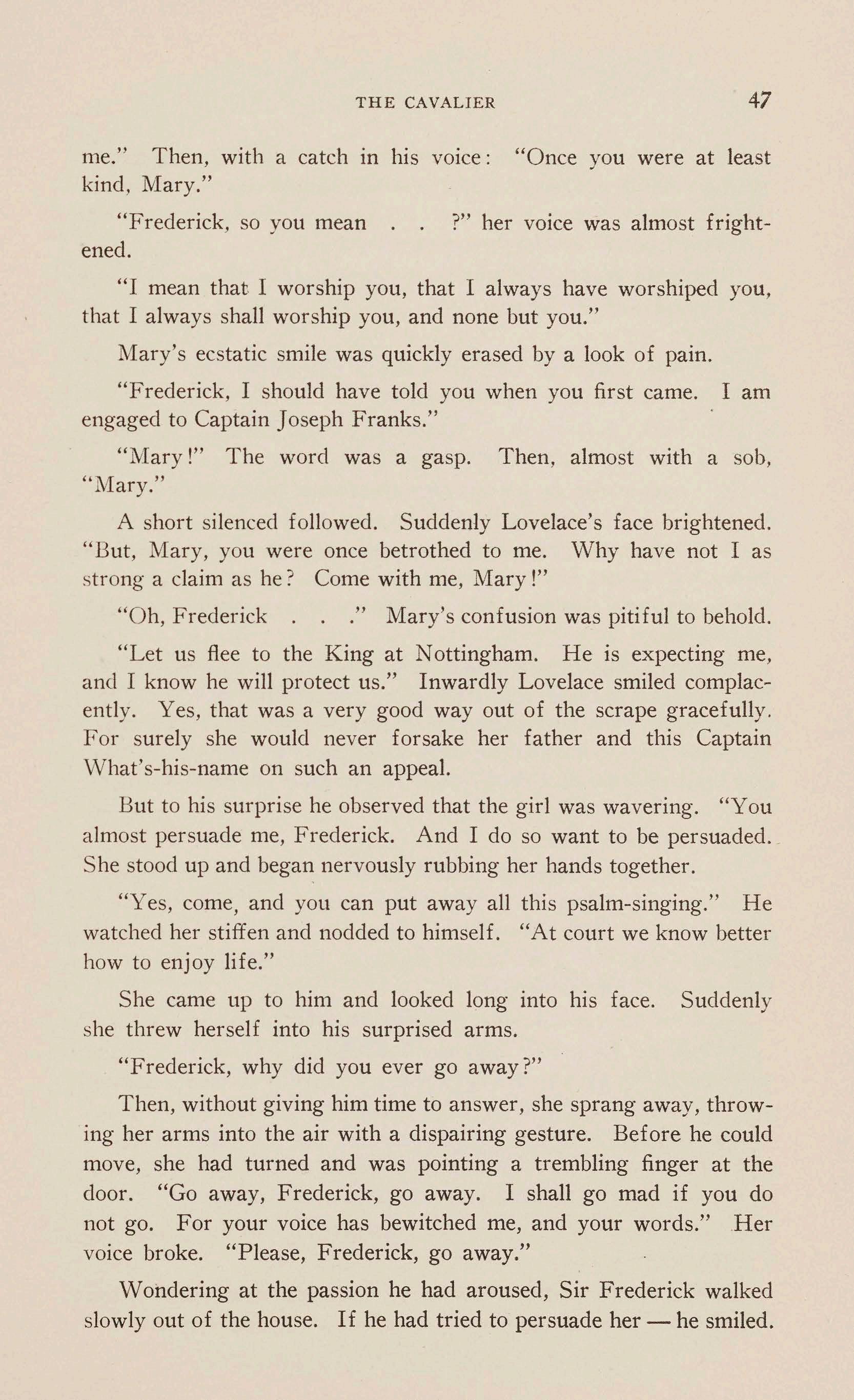
me." Then, with a catch in his voice: "Once you were at least kind, Mary."
"Frederick, so you mean ened. ?" her voice was almost fright-
"I mean that I worship you, that I always have worshiped you, that I always shall worship you, and none but you."
Mary's ecstatic smile was quickly erased by a look of pain.
"Frederick, I should have told you when you first came. I am engaged to Captain Joseph Franks."
"Mary !" The word was a gasp. Then, almost with a sob, "Mary."
A short silenced followed. Suddenly Lovelace's face brightened. "But, Mary, you were once betrothed to me. Why have not I as strong a claim as he? Come with me, Mary!"
"Oh, Frederick ." Mary's confusion was pitiful to behold. "Let us flee to the King at Nottingham. He is expecting me, and I know he will protect us." Inwardly Lovelace smiled complacently. Yes, that was a very good way out of the scrape gracefully . For surely she would never forsake her father and this Captain \tVhat's-his-name on such an appeal.
But to his surprise he observed that the girl was wavering. "You almost persuade me, Frederick. And I do so want to be persuaded. She stood up and began nervously rubbing her hands together.
"Yes, come, and you can put away all this psalm-singing. " He watched her stiffen and nodded to himself. "At court we know better how to enjoy life."
She came up to him and looked long into his face. Suddenly she threw herself into his surprised arms.
"Frederick, why did you ever go away?"
Then, without giving him time to answer, she sprang away, throwing her arms into the air with a dispairing gesture. Before he could move, she had turned and was pointing a trembling finger at the door. "Go away, Frederick, go away. I shall go mad if you do not go. For your voice has bewitched me, and your words." Her voice broke. "Please, Frederick, go away."
Wondering at the passion he had aroused, Sir Frederick walked slowly out of the house. If he had tried to persuade her -he smiled.
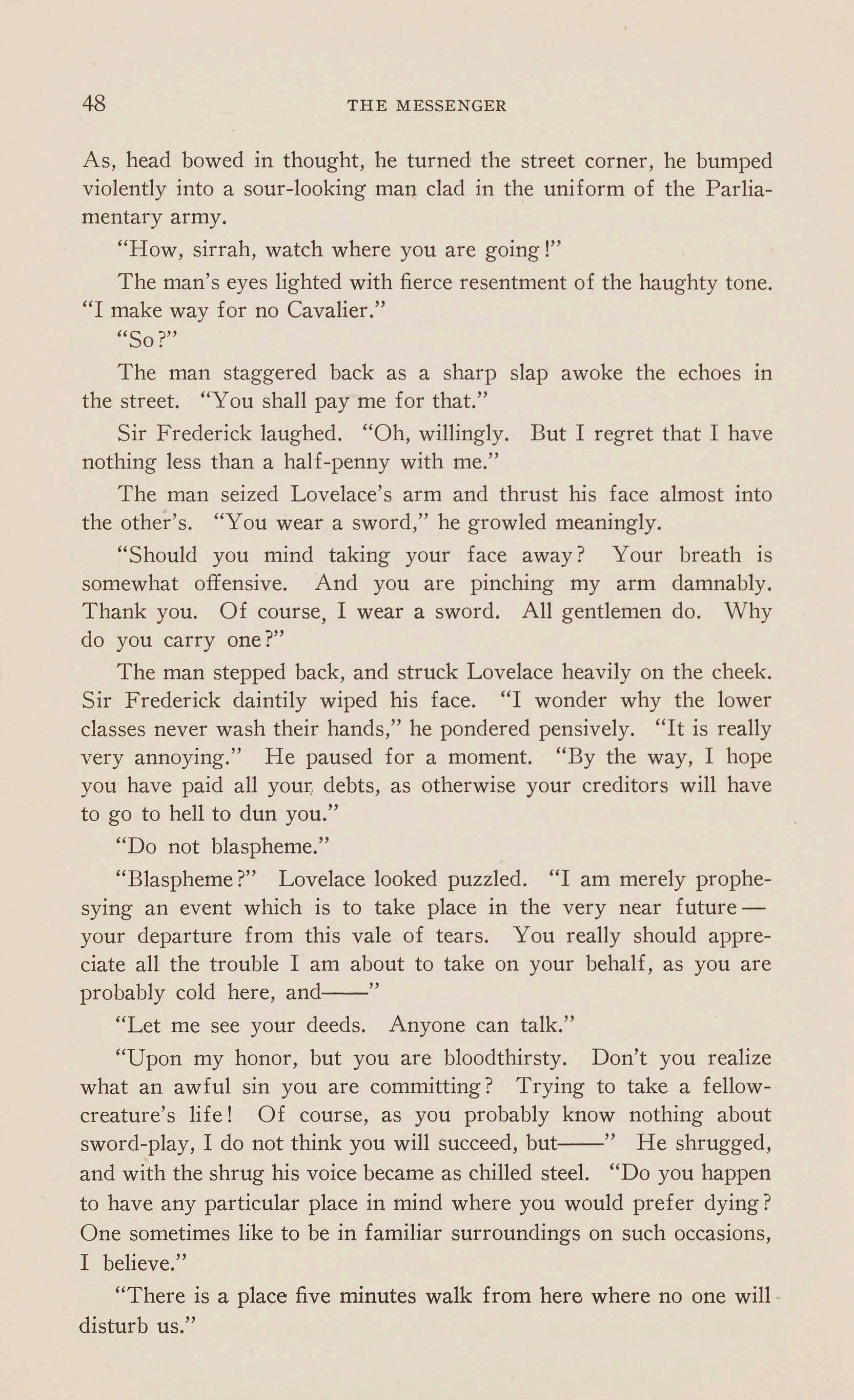
As, head bowed in thought, he turned the street corner, he bumped violently into a sour-looking man clad in the uniform of the Parliamentary army.
"How, sirrah, watch where you are going!"
The man's eyes lighted with fierce resentment of the haughty tone. "I make way for no Cavalier."
"So?"
The man staggered back as a sharp slap awoke the echoes in the street. "You shall pay me for that."
Sir Frederick laughed. "Oh, willingly. But I regret that I have nothing less than a half-penny with me."
The man seized Lovelace's arm and thrust his face almost into the other's. "You wear a sword," he growled meaningly.
"Should you mind taking your face away? Your breath is somewhat offensive. And you are pinching my arm damnably. Thank you. Of course, I wear a sword. All gentlemen do. Why do you carry one ?"
The man stepped back, and struck Lovelace heavily on the cheek. Sir Frederick daintily wiped his face. "I wonder why the lower classes never wash their hands," he pondered pensively. "It is really very annoying." He paused for a moment. "By the way, I hope you have paid all your, debts, as otherwise your creditors will have to go to hell to dun you."
"Do not blaspheme."
"Blaspheme?" Lovelace looked puzzled. "I am merely prophesying an event which is to take place in the very near futureyour departure from this vale of tears. You really should appreciate all the trouble I am about to take on your behalf, as you are probably cold here, and--"
"Let me see your deeds. Anyone can talk."
"Upon my honor, but you are bloodthirsty. Don't you realize what an awful sin you are committing? Trying to take a fellowcreature's life! Of course, as you probably know nothing about sword-play, I do not think you will succeed, but--" He shrugged, and with the shrug his voice became as chilled steel. "Do you happen to have any particular place in mind where you would pref er dying? One sometimes like to be in familiar surroundings on such occasions, I believe."
"There is a place five minutes walk from here where no one will disturb us."

Ten minutes later the two men were facing each other in a seldom-visited field. At the end of the salute, and just before engaging, Lovelace lowered the point of his sword.
"Permit me to introduce myself. I am Sir Frederick Lovelace, Major in His Majesty's Own Regiment of Light Cavalry."
"My name is Joseph Franks. I am a captain in the fifth Devonshire in the army of the Lord."
"Captain Franks?" Lovelace raised his eyebrows quizzically. "On guard, Captain!"
The blades crossed. After a moment's testing , Sir Frederick disengaged and lunged in sixte. Captain Franks swayed forward slightly and the blade passed behind his back. Sir Frederick recovered and laughed joyously. "My clear Captain, it is abominably poor form to avoid the point other than by parrying _ it. I warn you that I intend to hit you in the right lung in one of my next four passes. The right lung is fortunate for me."
Captain Frank s began to grow pale. This accursed Cavalier was now cont enting himself with parrying, not making a single attack. And the Captain was beginning to grow tired. It might be well for him to adopt the same tactics. No , there was an excellent opening. He lunged. By the merest touch his point was deflected. He sensed, rather than saw, the coming riposte, and strove desperately to recover. He heard a light laugh , there was a quick flash, and Lovelace stepped back, still smiling
"\rVell, captain ?"
The captain looked at him wonderingly. He had been hit, but surely Lov elace did not tliink that a mere scratch was going to stop him. "Well?" he replied.
"I think that ends our little affair. The right lung, I believe. Any last message or anything of the sort to our dear Mary:"
"Mary? You dog! On guard !"
But a s the captain started to lift his arm a fit of coughing seized him. He put his hand to his mouth. \i\Then he took it away, the back of it was smeared with reel froth. Lovelace looked at him amusedly. About an inch above the captain's right pap was spreading a reel stain. The captain started towards the city, while Sir Frederick watched him speculatively, as though trying to calculate the distance he could go. Another fit of coughing seized him. Suddenly he staggered, fell to his knees, and then slowly rolled over on his back. The Cavalier wiped the point of his sword on his handkerchief, sheathed it, and, affectedly stifling a yawn, walked away to where his horse was waiting to carry him to Nottingham.
LESLIE L. JONES
M. s. SHOCKLEY
C. B. H. PHILLIPSvv. R. VAIDEN
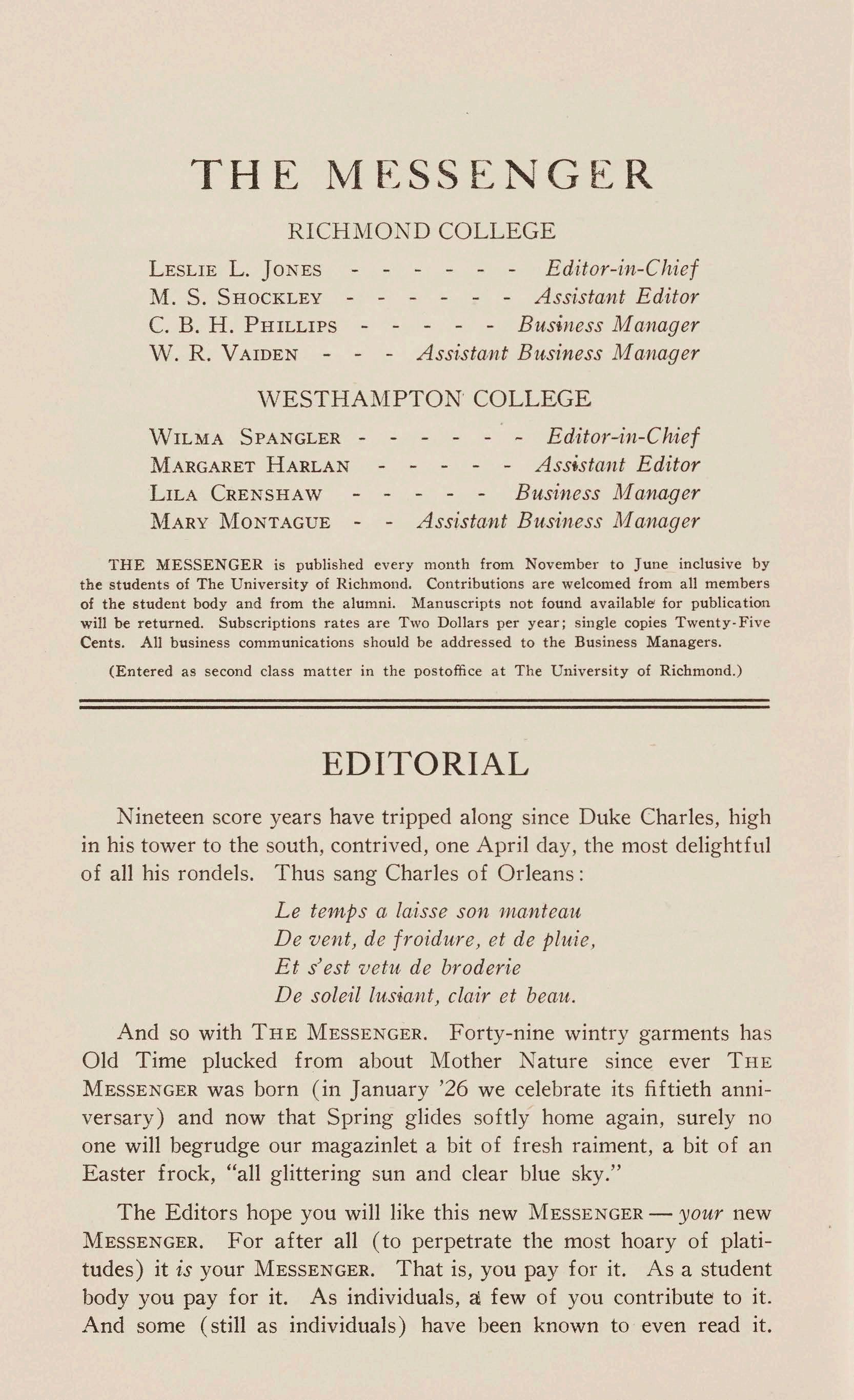
Editor-in-Chief - Assistant Editor Business Manager - Assistant Bitsiness Manager
WILMA SPANGLERMARGARETHARLAN
LILA CRENSHAw
MARY MONTAGUE- - Editor-in-Chief - Assistant Editor
Business Manager - Assistant Busfriess Manager
THE MESSENGER is publishedeverymonthfrom Novemberto June inclusiveby the studentsof TheUniversityof Richmond.Contributionsare welcomedfromall members of the studentbodyand fromthe alumni. Manuscriptsnot foundavailable'for publication willbe returned. Subscriptionsrates are TwoDollarsper year; singlecopiesTwenty-Five Cents. All businesscommunicationsshouldbe addressedto the BusinessManagers. (Enteredas secondclassmatterin the postofficeat The Universityof Richmond.)
Nineteen score years have tripped along since Duke Charles, high in his tower to the south, contrived, one April day, the most delightful of all his rondels. Thus sang Charles of Orleans:
Le temps a laisse son nianteau De vent, de froidure, et de pluie, Et s'est vetu de broderie De soleil lusiant, clair et beau.
And so with THE MESSENGER. Forty-nine wintry garments has Old Time plucked from about Mother Nature since ever THE MESSENGERwas born ( in January '26 we celebrate its fiftieth anniversary) and now that Spring glides softly home again, surely no one will begrudge our magazinlet a bit of fresh raiment, a bit of an Easter frock, "all glittering sun and clear blue sky."
The Editors hope you will like this new MESSENGER - your new MESSENGER. For after all ( to perpetrate the most hoary of platitudes) it is your MESSENGER. That is, you pay for it. As a student body you pay for it. As individuals, a few of you contribute to it. And some ( still as individuals) have been known to even read it.
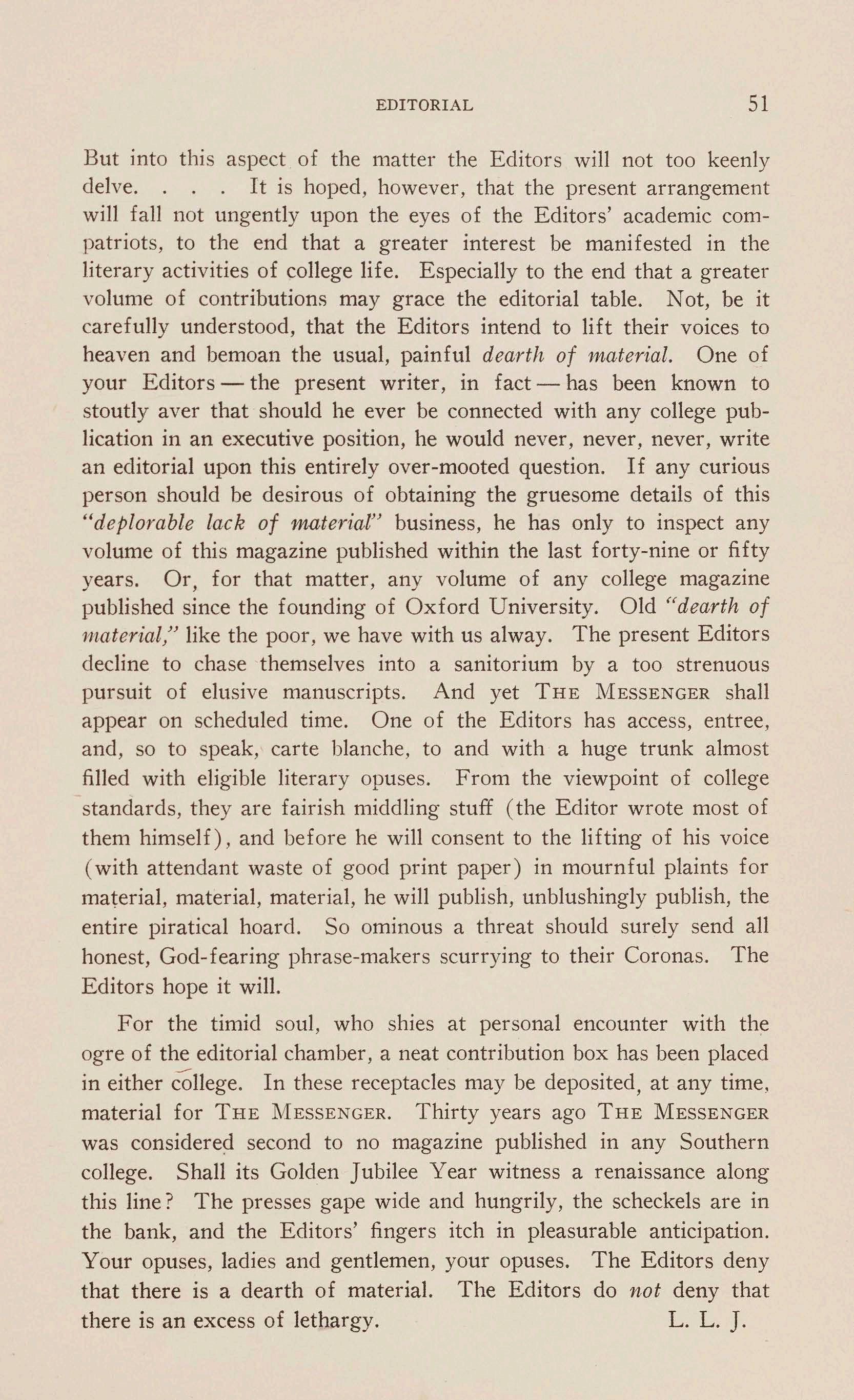
But into this aspect of the matter the Editors will not too keenly delve. It is hoped, however, that the present arrangement will fall not ungently upon the eyes of the Editors' academic compatriots, to the end that a greater interest be manifested in the literary activities of college life. Especially to the end that a greater volume of contributions may grace the editorial table. Not, be it carefully understood, that the Editors intend to lift their voices to heaven and bemoan the usual, painful dearth of material. One of your Editors -the present writer, in fact-has been known to stoutly aver that should he ever be connected with any college publication in an executive position, he would never, never, never, write an editorial upon this entirely over-mooted question. If any curious person should be desirous of obtaining the gruesome details of this "deplorable lack of material" business, he has only to inspect any volume of this magazine published within the last forty-nine or fifty years. Or, for that matter, any volume of any college magazine published since the founding of Oxford University. Old "dearth of material," like the poor, we have with us alway. The present Editors decline to chase themselves into a sanitarium by a too strenuous pursuit of elusive manuscripts. And yet THE MESSENGERshall appear on scheduled time. One of the Editors has access, entree, and, so to speak, carte blanche, to and with a huge trunk almost filled with eligible literary opuses. From the viewpoint of college standards, they are fairish middling stuff ( the Editor wrote most of them himself), and before he will consent to the lifting of his voice ( with attendant waste of good print paper) in mournful plaints for material, material, material, he will publish, unblushingly publish, the entire piratical hoard. So ominous a threat should surely send all honest, God-fearing phrase-makers scurrying to their Coronas. The Editors hope it will.
For the timid soul, who shies at personal encounter with the ogre of the editorial chamber, a neat contribution box has been placed in either college. In these receptacles may be deposited, at any time, material for THE MESSENGER. Thirty years ago THE MESSENGER was considered second to no magazine published in any Southern college. Shall its Golden Jubilee Year witness a renaissance along this line? The presses gape wide and hungrily, the scheckels are in the bank, and the Editors' fingers itch in pleasurable anticipation. Your opuses, ladies and gentlemen, your opuses. The Editors deny that there is a dearth of material. The Editors do not deny that there is an excess of lethargy. L. L. J.
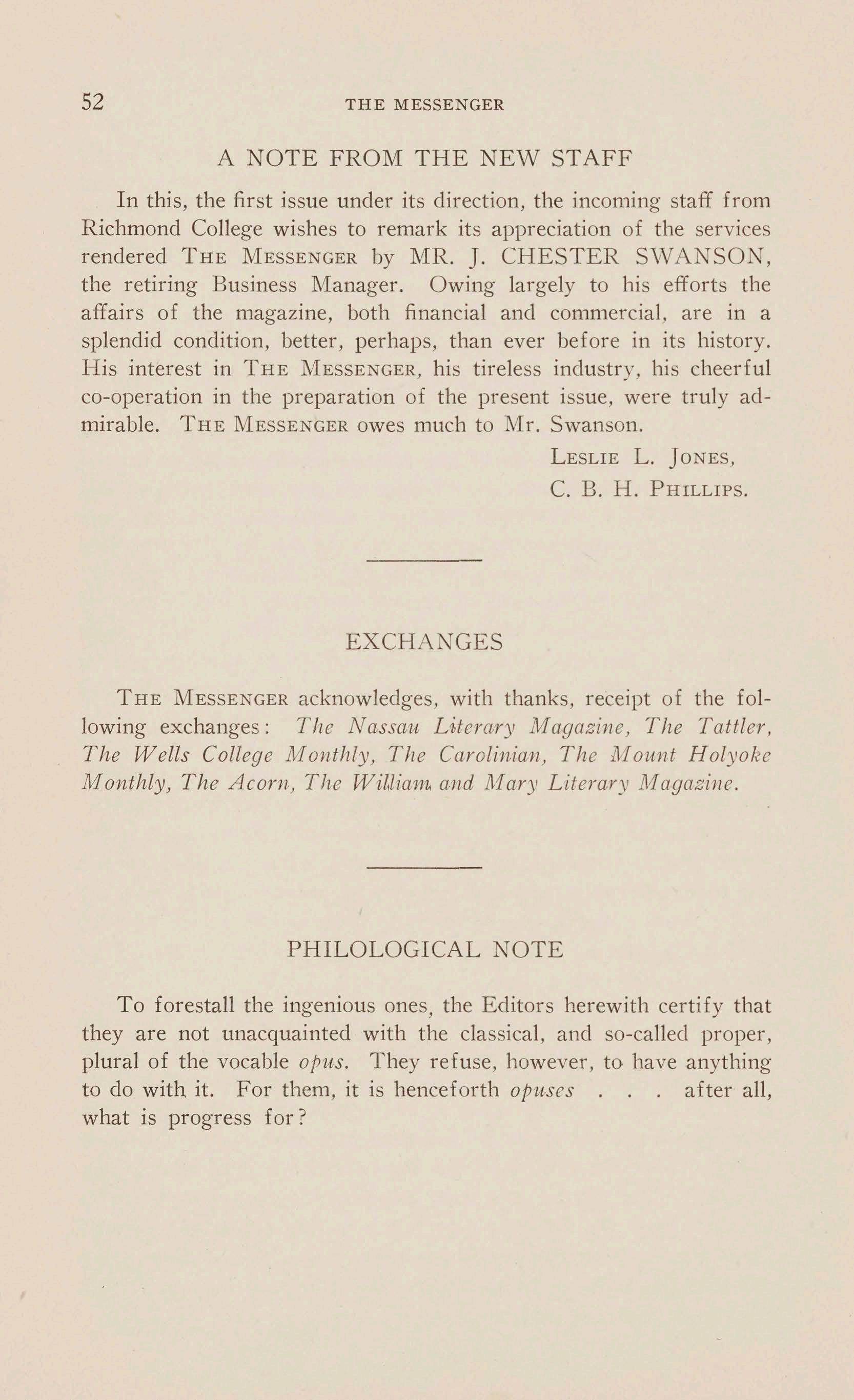
In this, the first issue under its direction, the incoming staff from Richmond College wishes to remark it s appreciation of the services rendered THE MESSENGERby MR. J . CHESTER SWANSON, the retiring Business Manager. Owing largely to his efforts the affairs of the magazine, both financial and commercial. are in a splendid condition, better, perhaps, than ever before in its history. His interest in THE MESSENGER,his tireless industry, his cheerful co-operation in the preparation of the present iss ue , were truly admirable. THE MESSENGERowes much to Mr. Swanson.
LESLIE L. JONES , C. B. H. PHILLIPS.
THE MESSENGERacknowledges, with thanks, receipt of the following exchanges: The Nassau Liternry Magazine, The Tattler, The Wells Coll ege Monthly, The Carolinian, The llfou11t Holy olce Monthly, The Acorn, The William and iVlary Literary Magazine.
To forestall the ingenious ones, the Editors herewith certify that they are not unacquainted with the classical, and so-called proper, plural of the vocable opus. They refuse, however, to have anything to do with it. For them, it is henceforth opuses after all, what is progress for?